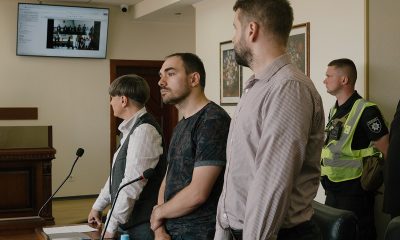World
Out in the World: LGBTQ+ news from Europe & Asia
LGBTQ+ news stories from around the globe including Australia, China, Philippines, Ukraine, Slovenia & Qatar

AUSTRALIA

(Screenshot/YouTube ABC News Australia)
SYDNEY, Australia – As the 46th Sydney Gay and Lesbian Mardi Gras ended its two week long celebrations with the annual massive Mardi Gras parade on Oxford Street this past weekend, this year’s celebration marred by the murder of a gay couple that jarred the country’s entire LGBTQ+ community, the parade came to a halt on Saturday in a powerful act of remembrance for the couple, Jesse Baird and Luke Davies.
In its annual float, Qantas airlines paid tribute to Davies who worked for the carrier as a flight attendant. A Qantas spokesperson confirmed that Davies’ name was added prominently on the side of the Qantas float, and the airline’s Executive Manager Cabin Crew Leeanne Langridge in a statement said that Davies “was a much-loved member of the Qantas cabin crew community in Brisbane and Sydney.
“He had a passion for travel, life, his family and friends and the customers that he served. He will be deeply missed. The whole team at Qantas are thinking of Luke and Jesse’s loved ones,” Lanridge said.
The Sydney Star Observer, the country’s largest queer news media outlet, reported that a New South Wales police officer Beaumont Lamarre-Condon, who reportedly once dated Baird a Network 10 reporter and a sports official, umpiring in AFL matches in the Northern Football and Netball League, has been charged with their murders.
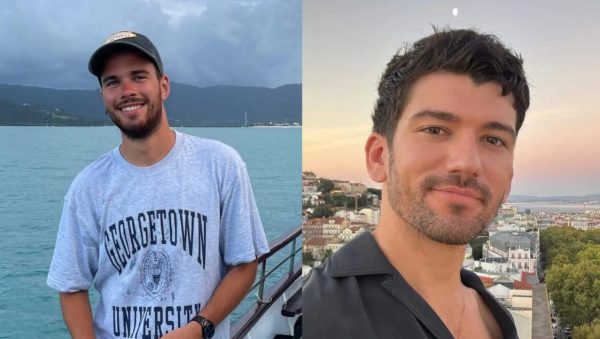
Lamarre-Condon is accused of shooting them dead with his police-issued sidearm at Baird’s home in Paddington, Sydney. The couple’s remains were found at a property at Bungonia, near Goulburn, around 185 kilometers south of Sydney on February 27, 2024.
The murder of the couple caused the Sydney Gay and Lesbian Mardi Gras organizers to uninvite police from the iconic Mardi Gras parade the BBC reported.
The parade’s board said the decision to exclude police, who have taken part in the annual march for over two decades, was “not taken lightly” but that it was essential to create a safe environment “to protest, celebrate” and “honour and grieve those we’ve lost”.
Sydney’s Mardi Gras parade has a complex history of both LGBT activism and police brutality, after the first march in 1978 resulted in dozens of people being beaten and arrested by local officers, the BBC noted.
CHINA

HONG KONG, China – A Chinese transgender activist is facing deportation back to mainland China as she is scheduled for release on Sunday from Siu Lam Psychiatric Center, a psychiatric detention institution where Hong Kong authorities usually hold transgender detainees.
Lai Ke (also known as Xiran) was convicted of using “forged” documents to attempt to travel from China to Toronto, Canada via Hong Kong last year. Lai Ke was detained at Hong Kong International Airport on May 3, 2023 while transferring to a flight to Toronto having begun her journey in Shanghai.
Lai was convicted in a Hong Kong court on 16 June 2023 and sentenced to 15 months in prison, which she served at the Siu Lam Psychiatric Center. A release notice from the Center seen by Amnesty International states that Lai is due to be released early for good behaviour on 2 March. As Lai is not a resident of Hong Kong, she is subject to being deported to mainland China under Section 19 of the Hong Kong Immigration Ordinance.
“Time is of the essence to prevent Lai Ke from being unlawfully deported to mainland China, where she would be at grave risk of serious human rights violations – including arbitrary detention, unfair trial, and even torture and other ill-treatment – due to both her transgender identity and her activism,” Sarah Brooks, the Deputy Regional Director, Asia for Amnesty International said.
“To return her given these risks would be an abandonment of Hong Kong’s obligations under international law.”
Lai Ke had been a vocal advocate for transgender rights in China alongside her partner. According to her friends, her partner was imprisoned in China in June 2023 on account of her own activism and her transgender identity.
While serving her sentence, Lai has been denied access to the medication she was taking as a part of her hormone replacement therapy and held in solitary confinement for complaining about the denial of her medical treatment, her friends added.
“There is a very real risk that Lai Ke will face persecution – including further imprisonment – if she is returned to mainland China,” said Brooks.
PHILIPPINES
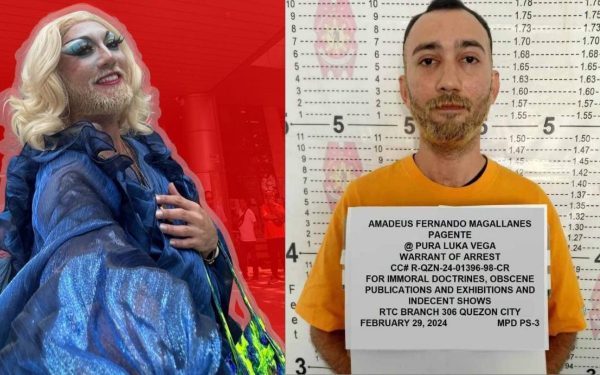
(Photo Credit: Pura Luka Vega/Amadeus Fernando Pagente & Manila Police)
MANILA, Luzon, Philippines – A 33-year-old drag queen who had been incarcerated in a Manila jail last Fall for allegedly violating the Catholic-majority country’s obscenity laws for his performance dressed as Jesus Christ, performing a rock version of the Lord’s Prayer in Tagalog, was arrested again this past week.
Investigators from the Manila Police District, charged Amadeus Fernando Pagente, who performs under the stage/drag name Pura Luka Vega, for six counts of alleged violation of Article 201 including immoral doctrines, obscene publications and exhibitions, and indecent shows. The arrest of the drag artist on February 29, 2024, was due to a warrant issued by a court in Quezon City.
Supporters and fans raised the bail of 720,000 Philippine pesos, (12852.55 USD) and Pagente was released on Friday, March 1. In a post on X (formerly Twitter) the drag artist thanked his benefactors writing: “The fight still goes on, life still goes on. I am very grateful to those who helped me with my bail. To my drag sisters who tirelessly helped me and organized fund raising for legal fees, thank you very much. Thank you.”
These latest charges stem from a complaint issued by the Kapisanan ng Social Media Broadcasters ng Pilipinas, a broadcast media organization, on behalf of Philippines for Jesus Movement.
This is the second time the Philippines for Jesus Movement, comprising Protestant church leaders, has registered a criminal complaint with prosecutors against the drag performer. He was accused of violating obscenity laws for his performance dressed as Jesus Christ, performing a rock version of the Lord’s Prayer in Tagalog last August. He was incarcerated and then later released.
At the time Pagente told Agence France-Presse: “The arrest shows the degree of homophobia” in the Philippines. “I understand that people call my performance blasphemous, offensive, or regrettable. However, they shouldn’t tell me how I practice my faith or how I do my drag.”
Ryan Thoreson, a specialist at the Human Rights Watch’s LGBT+ rights program, also called for the charges against Pagente to be dropped. “Freedom of expression includes artistic expression that offends, satirizes, or challenges religious beliefs,” Thoreson told the BBC.
UKRAINE
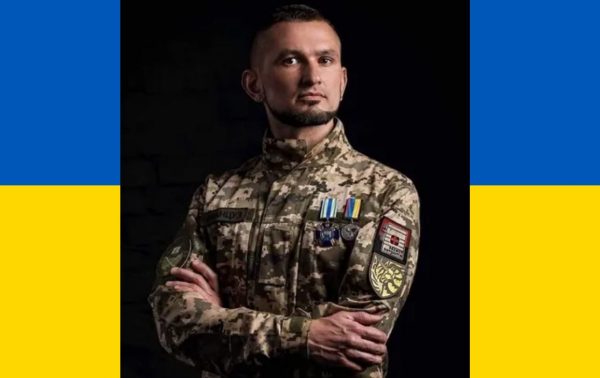
KYIV, Ukraine – A Ukrainian army combat medic was stripped of honors awarded to his unit by the Ukrainian Orthodox Church after the church leadership was informed that he was gay.
Viktor Pylypenko, a medic with 1st mechanized battalion, 72nd Black Zaporozhians Brigade medical corps along with his fellow servicemembers were awarded medals for “sacrifice and love to Ukraine” by the Ukrainian Orthodox Church of the Kyiv Patriarchate’s Patriarch Filaret for their actions and deeds serving in the Donbas region against the Russian invaders.
Pylypenko who serves as an openly gay soldier together with the commander of the medical corps, Yurii Lytvynenko, arrived from Donbas to receive the medals from Patriarch Filaret. The Patriarch personally thanked Pylypenko for his service.
According to the Ukrainian news website obozrevatel.com, that after receiving the award, the soldier published a post on his Facebook page thanking Patriarch Filarett for the award, thinking that in this way the UOC changed its attitude towards the LGBTQ+ community.
“I am sincerely glad that Patriarch Filaret took such a step and thanked me, an openly gay man and human rights activist, for the protection. He gave me a medal with his signature and seal. He and the Kyiv Patriarchate headed by him have radically changed their position on LGBTQ+ people and no longer consider us “sinful” or the cause of the coronavirus,” Pylypenko wrote.
On February 25 the church responded in its own Facebook post calling Pylypenko’s post a falsehood:
Among the distinguished military personnel of the medical point was Victor Pilipenko. Unfortunately, on his social media pages, he posted false information about Patriarch Filaret awarding him a distinction as openly gay for human rights and that Patriarch Filaret and the Kyiv Patriarchate radically changed their negative position on LGBT.
This is an outright lie and manipulation.
Taking into account the efforts of the dark forces to distort the consistent position of the upc of the Kyiv Patriarchate, we want to officially state:
1. Soldier Victor Pilipenko received a thank you from the Church, exclusively as a defender of Ukraine, not as an LGBT activist, at the submission of his fellow soldiers from the combat unit of the heroic 72nd Brigade of the Black Zaporozhye. Patriarch Filaret did not personally award the Pilipenkoví medal and did not know about his sinful tendencies.
2. Holy Patriarch Filaret and the Ukrainian Orthodox Church of the Kyiv Patriarchate, based on the foundations of the Holy Scriptures, the thousand-year teaching of the Orthodox Church, invariably occupies a principled negative position on Sodom sin, condemns propaganda t. zv “same-sex marriages”. Homosexual sex relationships are a false distortion of the God-given nature of man. As said in the Bible, the Lord Himself for the sins of people destroyed Sodom and Homorrah. The Patriarch repeatedly stated it publicly and in court proved the legality of such his right.
3. We thank warrior Victor Pilipenko (as well as all our defenders for defending our liberty and territorial integrity) for his military service, but we do not divide his sinful likeness and LGBT agitation. We inform that due to open propaganda of sinful ideology and the denial of the existence of God, consider the church award to Victor Pilipenko from 08.02.2024 Order no. 27468 – revoked.
The Apostle Paul in the first letter to the Corinthians warned: “he deceive yourself: neither prostitutes, nor idolosuluzeliji, nor adulterous, nor malakí̈, nor mužoložcí, nor thieves, nor lehvari, nor drunkards, nor lihoslovci, nor predators – the kingdom of God will not inherit. And such were some of you; but washed, but sanctified, but justified in the name of our Lord Jesus Christ and by the Spirit of our God» (1 Cor. 6, 9-11).
Based on the foundations of Christian evangelical love for all, sinners in particular, desiring them salvation, we urge everyone to repent of their personal sins.
Then the church’s press service said: “We would like to inform you that in view of the open propaganda of a sinful ideology and the denial of the existence of God, the church award to Viktor Pylypenko is hereby revoked.”
Pilipenko then accused the Kyiv Patriarchate of awarding the medals as a PR campaign:
“I wrote words of gratitude to Filaret, naively imagining that he deliberately awarded me and showed his colleagues a Christian, undoubtedly noble gesture, a signpost to reconciliation and mutual respect for gays, atheists, and people of other faiths. But everything turned out to be more prosaic: Filaret was just handing out his awards as a PR campaign for his denomination.”
Outrage from his fellow soldiers and others has been building regarding the Kyiv Patriarchate’s actions.
Ilia Krotenko, a fighter with the 72nd Black Zaporozhians Brigade, emphasized that the “trinkets” handed out by the church are worthless.
“In connection with the absolutely disgusting act of the UOC-Kyiv Patriarchate and Patriarch Filaret, who took away the award from war veteran Viktor Pylypenko only because he is openly gay, I also refuse a similar award of my own,” he wrote.
SLOVENIA
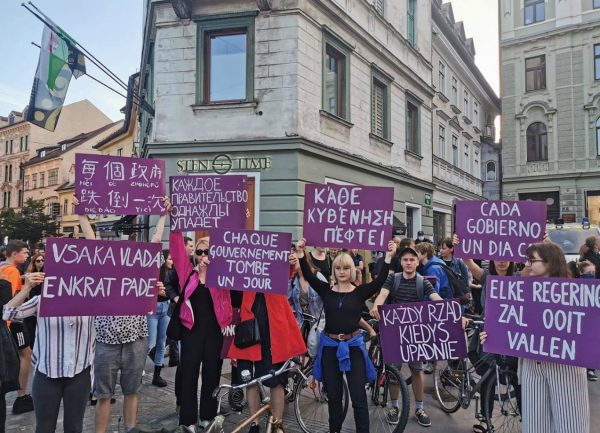
(Photo Credit: 8th of March Research Institute)
LJUBLJANA, Slovenia – Activists from across Europe, including Slovenia, Spain, France and Poland formed an alliance to launch a petition today to collect over 300,000 signatures as a first step towards laying the groundwork to ensure that in Europe, reproductive rights are safeguarded and accessible for each and every woman.
This event marks a pivotal moment where voices from diverse European nations unite to advocate for reproductive rights, underscoring the collective resolve to ensure the safety and accessibility of abortion services across the continent.
Nika Kovac, founding director of the 8th of March Research Institute, part of the new alliance, said, “The need to kick off the petition is driven by a deep concern over the erosion of reproductive rights, as witnessed in various parts of the world, including the United States and Poland. We are dedicated to creating a network of friends united by shared values of empathy and solidarity. The key to change is international solidarity.”
“The freedom to choose our body is a common value in every single country of Europe. We are here to demand that it also becomes a right that everyone has in practice,” she added.
Though a large majority of Europeans support abortion, the values of women’s bodily autonomy and their freedom to choose are not shared by all governments and state laws. In a significant number of EU countries, legal and access restrictions prove to be a considerable hurdle for those who need it the most. Slovenia has proven to be a significant outlier, being the only European country to enshrine the right to abortion in its constitution with France currently trying to do the same.
“Ban on abortion kills women, ban on abortion ruins lives and the lack of access to abortion kills women and ruins lives,” said Marta Lempart, founder of Polish Women’s Strike, who has been the loudest advocate for reproductive rights in the country.
“In my country, women die in state hospitals because they are denied abortions. Each time it happens, we cry and protest and say ‘not one more’ but today I am not here to cry and shout but to say that we can get through it. You will never walk alone.”
“In many countries, abortions are legal but not free, so, it’s only for rich people; Also, in many countries abortions are legal, but women are intimidated, and humiliated for accessing a health service. This should not be happening. We need solidarity as we need to protect women not only in Poland but across Europe.”
Alice Coffin, who leads permanent action against patriarchal structures that harm French society and is a member of the alliance, said, “While Poland is infamous for severely restricted access to abortion, populist far-right parties with the same agenda are emerging across the continent. Their anti-abortion agenda is rarely in the forefront of their public communication but it becomes an important policy point if they achieve power. However, there is widespread public opposition to these measures.”
She added, “The French Senate is due to vote on including abortion in its Constitution on Wednesday 28 February. The President of the Senate is opposed. The Vatican has expressed its anger. But we have every hope that it will come to pass. So, abortion is an issue that will be very much on the political and media agenda in France over the next few days.”
The petition will actively be distributed among various individuals across multiple countries to ensure wide reach and engagement with the aim of gathering an initial 300,000 signatures. With this petition, the coalition hopes to build momentum and support for the substantive changes they aim to achieve.
The initiative represents a powerful, united front of committed individuals and organizations, and was attended by prominent feminist activists including Nika Kovač who has been one of the initiators of the #metoo movement in Slovenia, Marta Lempart, activist, and founder of the Polish Women’s Strike, who has been the loudest advocate for reproductive rights in a country with an almost total ban on abortions and has organized the biggest pro reproductive rights protests in the history of Poland (Poland), Alice Coffin, renowned feminist and author from France, Silvia Casalino, activist from France, along with Dr. Imma Clarà, director of the Spanish organization L’Associació, LGBT activist and researcher Kika Fumero, feminist activist and journalist Cristina Fallarás who launched the Spanish #MeToo movement, #Cuéntalo (Spain) participated in the petition launch.
The coalition’s political stance stems from a fundamental disagreement with the reality that women in Europe still face life-threatening risks due to lack of access to safe abortion services.
The coalition’s overall goal is to safeguard and advance abortion rights across Europe, ensuring that all women have access to the safe, respectful, and legal healthcare services they deserve.
QATAR
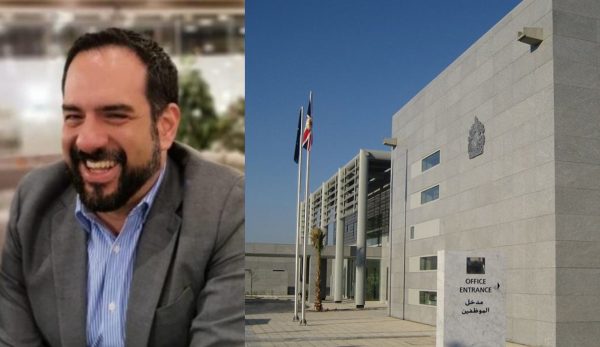
(Photo Credit: Twitter/UK Government)
DOHA, Qatar – An HIV positive openly gay dual British and Mexican citizen is being held because of his sexuality in this peninsular Arab country bordering the Persian Gulf. Manuel Guerrero Aviña, 44-year-old Qatar Airways employee, has been imprisoned since February 4 after responding to a false Grindr text.
PinkNewsUK reported according to his brother Enrique Aviña, who is leading the campaign QatarFreeManuel, his brother is being imprisoned because of his sexuality, and has been denied access to antiretroviral medicines.
“Qatar police used a false Grindr profile to contact Manuel and invite him to participate in a meeting with other people from the LGBT community in the city of Doha,” Enrique Aviña told British newspaper The Mirror.
“Manuel was supposed to meet a person he thought he had arranged an appointment with on the night of 4 February but instead encountered police officers who were waiting to arrest him.”
“He has been denied the right to a lawyer and has been forced to sign documents in Arabic without a translator to assist him. Even worse, he has been prevented access to antiretroviral medicines he needs to be able to live with HIV, which constitutes an act of torture and puts his life at risk,” Enrique Aviña said.
PinkNewsUk also reported because Aviña registered as a British national when he was hired by Qatar Airlines and moved there to work, the Mexican Embassy in Qatar said, the British Embassy is dealing with his case, but Mexican consular officers been in contact with his family.
“With regards to the case of Manuel Guerrero Aviña, who has Mexican and British nationality and is currently under arrest in Doha, the Mexican Embassy in Qatar confirms it has been following developments since it was informed about the detention,” an embassy statement read.
“It has been in constant contact with his relatives and has confirmed Manuel has legal representation.”
A spokesperson for the UK Foreign Office told PinkNewsUK: “We are providing consular assistance to a British man who is detained in Qatar and are supporting his family.”
Additional reporting from The Sydney Star Observer, ABC News Australia, The BBC, Agence France-Presse, Obozrevatel.com, Kyiv Post, and PinkNewsUK.
Colombia
Gay Venezuelan man who fled to Colombia uncertain about homeland’s future
Heberth Aguirre left Maracaibo in 2018
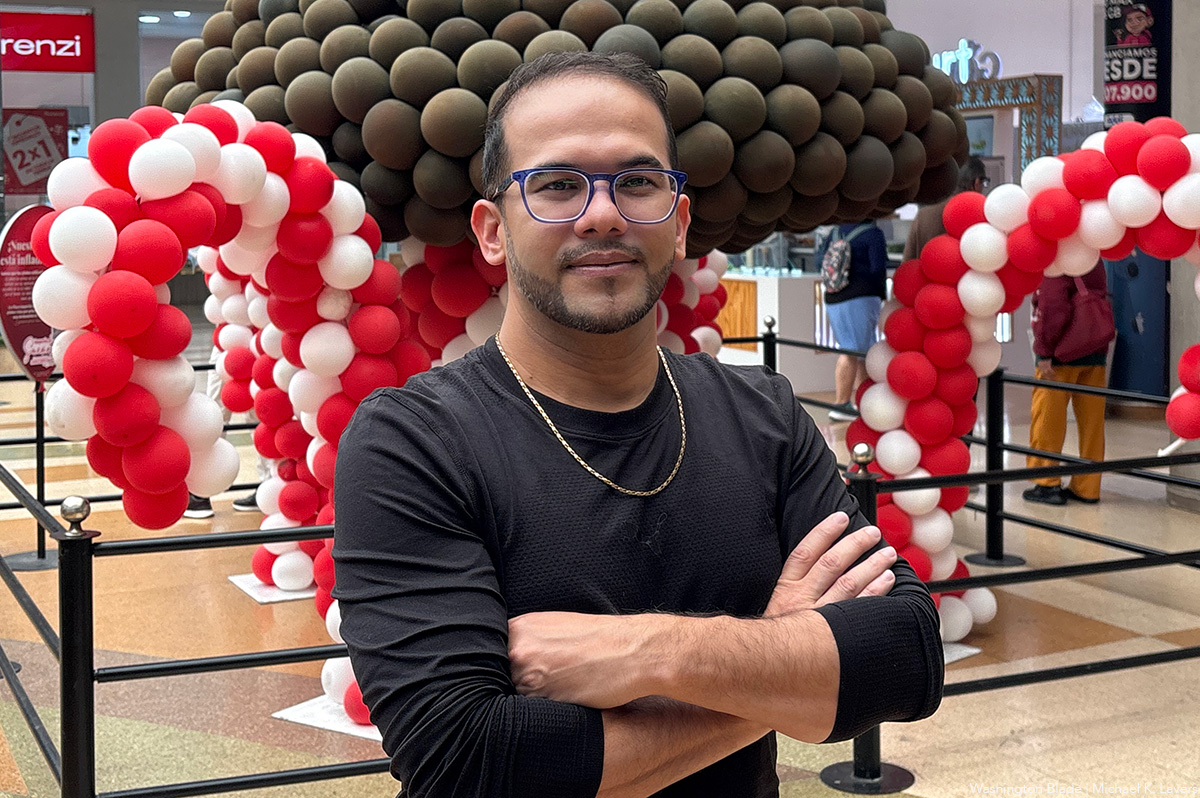
BOGOTÁ, Colombia — A gay Venezuelan man who has lived in Colombia since 2018 says he feels uncertain about his homeland’s future after the U.S. seized the now former Venezuelan President Nicolás Maduro.
“On one hand I can feel happy, but on the other hand I feel very concerned,” Heberth Aguirre told the Washington Blade on Tuesday during an interview at a shopping mall in Bogotá, the Colombian capital.
Aguirre, 35, is from Maracaibo, Venezuela’s second-largest city that is the heart of the country’s oil industry.
He developed cultural and art initiatives for the Zulia State government.
“Little by little, I suddenly became involved in politics because, in a way, you had to be involved,” recalled Aguirre. “It was necessary to be involved because the regime often said so.”
“I basically felt like I was working for the citizens, but with this deeply ingrained rule we had to be on their side, on the side of the Maduro and (former President Hugo) Chávez regime,” he added.
Maduro in 2013 became Venezuela’s president after Chávez died.
“There are things I don’t support about the regime,” Aguirre told the Blade. “There are other things that were nice in theory, but it turned out that they didn’t work when we put them into practice.”
Aguirre noted the Maduro government implemented “a lot of laws.” He also said he and other LGBTQ Venezuelans didn’t “have any kind of guarantee for our lives in general.”
“That also exposed you in a way,” said Aguirre. “You felt somewhat protected by working with them (the government), but it wasn’t entirely true.”
Aguirre, 35, studied graphic design at the University of Zulia in Maracaibo. He said he eventually withdrew after soldiers, members of Venezuela’s Bolivarian National Guard, and police officers opened fire on students.
“That happened many times, to the point where I said I couldn’t keep risking my life,” Aguirre told the Blade. “It hurt me to see what was happening, and it hurt me to have lost my place at the university.”
Venezuela’s economic crisis and increased insecurity prompted Aguirre to leave the country in 2018. He entered Colombia at the Simón Bolívar Bridge near the city of Cúcuta in the country’s Norte de Santander Province.
“If you thought differently, they (the Venezuelan government) would come after you or make you disappear, and nobody would do anything about it,” said Aguirre in response to the Blade’s question about why he left Venezuela.
Aguirre spoke with the Blade three days after American forces seized Maduro and his wife, Cilia Flores, at their home in Caracas, the Venezuelan capital, during an overnight operation.
The Venezuelan National Assembly on Sunday swore in Delcy Rodríguez, who was Maduro’s vice president, as the country’s acting president. Maduro and Flores on Monday pleaded not guilty to federal drug charges in New York.
President Donald Trump on Tuesday in a Truth Social post said Venezuela’s interim authorities “will be turning over between 30 and 50 million barrels of high quality, sanctioned oil, to the United States of America.”
“This oil will be sold at its market price, and that money will be controlled by me, as president of the United States of America, to ensure it is used to benefit the people of Venezuela and the United States,” wrote Trump.
Trump on Sunday suggested the U.S. will target Colombian President Gustavo, a former Bogotá mayor and senator who was once a member of the M-19 guerrilla movement that disbanded in the 1990s.
Petro has urged Colombians to take to the streets on Wednesday and “defend national sovereignty.” Claudia López, a former senator who would become the country’s first female and first lesbian president if she wins Colombia’s presidential election that will take place later this year, is among those who criticized Trump’s comments.
“Let’s be clear: Trump doesn’t care about the humanitarian aspect,” said Aguirre when the Blade asked him about Trump. “We can’t portray him as Venezuela’s savior.”
Meanwhile, Aguirre said his relatives in Maracaibo remain afraid of what will happen in the wake of Maduro’s ouster.
“My family is honestly keeping quiet,” he said. “They don’t post anything online. They don’t go out to participate in marches or celebrations.”
“Imagine them being at the epicenter, in the eye of the hurricane,” added Aguirre. “They are right in the middle of all the problems, so it’s perfectly understandable that they don’t want to say anything.”
‘I never in my life thought I would have to emigrate’
Aguirre has built a new life in Bogotá.
He founded Mesa Distrital LGBTIQ+ de Jóvenes y Estudiantes, a group that works with migrants from Venezuela and other countries and internally placed Colombians, during the COVID-19 pandemic. Aguirre told the Blade he launched the group “with the need to contribute to the general population, not just in Colombia.”
Aguirre met his husband, an American from California, at a Bogotá church in December 2020 during a Christmas event that SDA Kinship Colombia, an LGBTQ group, organized. A Utah judge virtually officiated their wedding on July 12, 2024.
“I love Colombia, I love Bogotá,” said Aguirre. “I love everything I’ve experienced because I feel it has helped me grow.”
He once again stressed he does not know what a post-Maduro Venezuela will look like.
“As a Venezuelan, I experienced the wonders of that country,” said Aguirre. “I never in my life thought I would have to emigrate.”
The Colombian government’s Permiso por Protección Temporal program allows Aguirre and other Venezuelans who have sought refuge in Colombia to live in the country for up to 10 years. Aguirre reiterated his love for Colombia, but he told the Blade that he would like to return to Venezuela and help rebuild the country.
“I wish this would be over in five years, that we could return to our country, that we could go back and even return with more skills acquired abroad,” Aguirre told the Blade. “Many of us received training. Many of us studied a lot. We connected with organizations that formed networks, which enriched us as individuals and as professionals.”
“Returning would be wonderful,” he added. “What we’ve built abroad will almost certainly serve to enrich the country.”
Japan
Japan’s first female prime minister reluctant to advance LGBTQ+ rights
Sanae Takaichi became country’s head of government last month

Sanae Takaichi last month became Japan’s first female prime minister after she secured the Liberal Democratic Party’s leadership and both chambers of the Diet confirmed her.
She now leads a minority government after forming a coalition with the right-leaning Japan Innovation Party, following Komeito’s decision to end its 26-year partnership with the LDP. Her rise marks a historic break in Japanese politics, but the question remains whether she will advance the rights of Japan’s LGBTQ+ community?
Despite the milestone her election represents, Takaichi’s record on gender issues offers little indication of progressive change.
She has long emphasized “equality of opportunity” over structural reforms and has opposed measures that include allowing married couples to use separate surnames, a policy many women say would ease workplace discrimination. During her leadership bid Takaichi pledged to elevate women’s representation in government to Nordic levels, yet she appointed only two women to her 19-member Cabinet. Takaichi has also resisted efforts to modernize the Imperial Household Law to permit female succession, reinforcing her reputation as a conservative on women’s rights.
Takaichi’s stance on LGBTQ+ rights has been similarly cautious.
In a 2023 Diet budget committee session, she said there should be “no prejudice against sexual orientation or gender identity,” yet described extending marriage rights to same-sex couples as an “extremely difficult issue.”
Her earlier record is consistent.
In 2021, she opposed an LGBTQ+-inclusive anti-discrimination bill that members of her own party, arguing its wording was too vague.
Even after becoming LDP leader in October 2025, she reiterated her opposition to marriage equality and emphasized traditional family values. Takaichi highlighted that Article 24 defines marriage as being based on “the mutual consent of both sexes” and frames the institution around “the equal rights of husband and wife,” language she argues leaves no constitutional room for extending marriage rights to same-sex couples.
While her rhetoric avoids overt hostility, her record suggests limited appetite for the structural reforms sought by Japan’s LGBTQ+ community.
A series of landmark court rulings has built escalating pressure for national reform.
On March 17, 2021, the Sapporo District Court ruled that denying same-sex couples the legal benefits of marriage violated the constitution’s equality clause. In May 2023, the Nagoya District Court similarly declared the ban unconstitutional, with a subsequent decision from the Fukuoka District Court reaffirming Japan’s current legal framework clashes with constitutional equality principles.
The momentum peaked on Oct. 30, 2024, when the Tokyo High Court found the marriage ban incompatible with guarantees of equality and individual dignity.
Japan remains the only G7 country without legal recognition of same-sex couples.
Akira Nishiyama, a spokesperson for the Japan Alliance for LGBT Legislation, noted to the Los Angeles Blade that in leadership surveys the group conducted within the LDP in 2021 and again in 2025, Takaichi offered only a cautious position on reforming Japan’s legal gender recognition law. When asked whether she supported easing the requirements under the Act on Special Cases in Handling Gender Status for Persons with Gender Identity Disorder, she responded that “multifaceted and careful discussion is necessary,” avoiding any commitment to substantive change.
Nishiyama added the legal landscape has already shifted.
In October 2023, the Supreme Court ruled that the law’s sterilization requirement for legal gender recognition is unconstitutional, and several family courts have since struck down the appearance requirement on similar grounds. She urged the Takaichi administration to act quickly by amending the statute to remove these provisions, along with other elements long criticized as human rights violations.
“[Prime Minister] Takaichi has stated that ‘careful discussion is necessary’ regarding amendments to ‘Act on Special Cases in Handling Gender Status for Persons with Gender Identity Disorder’ and the enactment of anti-discrimination laws based on Sexual Orientation and Gender Identity (SOGI),” noted Nishiyama. “However, as indicated in Candidate (at that time) Takaichi’s responses to our survey, if she considers issues related to SOGI to be human rights issues, then she has to work hard to advance legal frameworks to address these issues.”
“For example, regarding the government’s announcement that they will consider whether same-sex couples could be included or not in the 130 laws concerning common-law marriages couples, [Prime Minister] Takaichi responded to our survey that ‘the government should continue to advance its consideration,’” she added. “As per this response, the Takaichi Cabinet should continue deliberating on this matter and ensure that same-sex couples are included in each relevant law.”
Takeharu Kato, an advocate for marriage equality who spoke to the Blade in a personal capacity, urged observers not to view Takaichi’s appointment solely through a negative lens.
He acknowledged she holds deeply conservative views within the LDP and has openly opposed marriage equality, but noted several aspects of her background could leave room for movement.
“She is Japan’s first female prime minister in history. Furthermore, she does not come from a political family background but rather from an ordinary household,” said Kato. “She also has an unusual career path, having graduated from a local university and worked as a television news anchor before entering politics.”
“Additionally, while her husband is a member of the Diet, he became partially paralyzed due to a cerebral infarction, and she has been caring for him,” he further noted. “She possesses several minority attributes like these, and depending on our future efforts, there is a possibility she could change her stance on same-sex marriage. It could also be said that, as a woman navigating the conservative Liberal Democratic Party, she has deliberately emphasized conservative attitudes to appeal to her base of right-wing supporters.”
Kato stressed that “having reached the pinnacle as prime minister, it cannot be said she (Takaichi) has no potential to change.”
“We need not alter the strategy we have pursued thus far,” Kato told the Blade. “However, we believe some fine-tuning is necessary, such as refining our messaging to resonate with those holding more conservative values.”
El Salvador
El Salvador: el costo del silencio oficial ante la violencia contra la comunidad LGBTQ+
Entidades estatales son los agresores principales
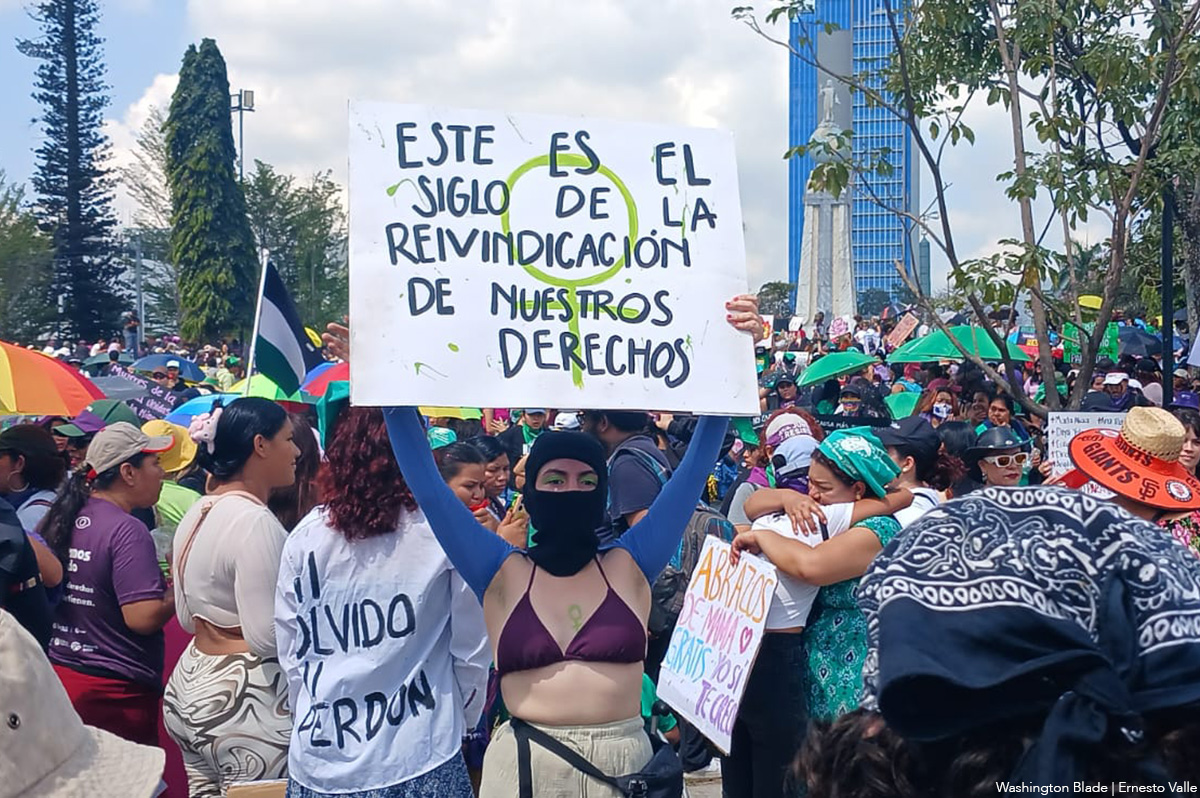
En El Salvador, la violencia contra la población LGBTQ+ no ha disminuido: ha mutado. Lo que antes se expresaba en crímenes de odio, hoy se manifiesta en discriminación institucional, abandono y silencio estatal. Mientras el discurso oficial evita cualquier referencia a inclusión o diversidad, las cifras muestran un panorama alarmante.
Según el Informe 2025 sobre las vulneraciones de los derechos humanos de las personas LGBTQ en El Salvador, elaborado por el Observatorio de Derechos Humanos LGBTIQ+ de ASPIDH, con el apoyo de Hivos y Arcus Foundation, desde el 1 de enero al 22 de septiembre de 2025 se registraron 301 denuncias de vulneraciones de derechos.
El departamento de San Salvador concentra 155 de esas denuncias, reflejando la magnitud del problema en la capital.
Violencia institucionalizada: el Estado como principal agresor
El informe revela que las formas más recurrentes de violencia son la discriminación (57 por ciento), seguida de intimidaciones y amenazas (13 por ciento), y agresiones físicas (10 por ciento). Pero el dato más inquietante está en quiénes ejercen esa violencia.
Los cuerpos uniformados, encargados de proteger a la población, son los principales perpetradores:
- 31.1 por ciento corresponde a la Policía Nacional Civil (PNC),
- 26.67 por ciento al Cuerpo de Agentes Municipales (CAM),
- 12.22 por ciento a militares desplegados en las calles bajo el régimen de excepción.
A ello se suma un 21.11 por ciento de agresiones cometidas por personal de salud pública, especialmente por enfermeras, lo que demuestra que la discriminación alcanza incluso los espacios que deberían garantizar la vida y la dignidad.
Loidi Guardado, representante de ASPIDH, comparte con el Los Angeles Blade un caso que retrata la cotidianidad de estas violencias:
“Una enfermera en la clínica VICITS de San Miguel, en la primera visita me reconoció que la persona era hijo de un promotor de salud y fue amable. Pero luego de realizarle un hisopado cambió su actitud a algo despectiva y discriminativa. Esto le sucedió a un hombre gay.”
Este tipo de episodios reflejan un deterioro en la atención pública, impulsado por una postura gubernamental que rechaza abiertamente cualquier enfoque de inclusión, y tacha la educación de género como una “ideología” a combatir.
El discurso del Ejecutivo, que se opone a toda iniciativa con perspectiva de diversidad, ha tenido consecuencias directas: el retroceso en derechos humanos, el cierre de espacios de denuncia, y una mayor vulnerabilidad para quienes pertenecen a comunidades diversas.
El miedo, la desconfianza y el exilio silencioso
El estudio también señala que el 53.49 por ciento de las víctimas son mujeres trans, seguidas por hombres gays (26.58 por ciento). Sin embargo, la mayoría de las agresiones no llega a conocimiento de las autoridades.
“En todos los ámbitos de la vida —salud, trabajo, esparcimiento— las personas LGBT nos vemos intimidadas, violentadas por parte de muchas personas. Sin embargo, las amenazas y el miedo a la revictimización nos lleva a que no denunciemos. De los casos registrados en el observatorio, el 95.35 por ciento no denunció ante las autoridades competentes”, explica Guardado.
La organización ASPIDH atribuye esta falta de denuncia a varios factores: miedo a represalias, desconfianza en las autoridades, falta de sensibilidad institucional, barreras económicas y sociales, estigma y discriminación.
Además, la ausencia de acompañamiento agrava la situación, producto del cierre de numerosas organizaciones defensoras por falta de fondos y por las nuevas normativas que las obligan a registrarse como “agentes extranjeros”.
Varias de estas organizaciones —antes vitales para el acompañamiento psicológico, legal y educativo— han migrado hacia Guatemala y Costa Rica ante la imposibilidad de operar en territorio salvadoreño.
Educación negada, derechos anulados
Mónica Linares, directora ejecutiva de ASPIDH, lamenta el deterioro de los programas educativos que antes ofrecían una oportunidad de superación para las personas trans:
“Hubo un programa del ACNUR que lamentablemente, con todo el cierre de fondos que hubo a partir de las declaraciones del presidente Trump y del presidente Bukele, pues muchas de estas instancias cerraron por el retiro de fondos del USAID.”
Ese programa —añade— beneficiaba a personas LGBTQ+ desde la educación primaria hasta el nivel universitario, abriendo puertas que hoy permanecen cerradas.
Actualmente, muchas personas trans apenas logran completar la primaria o el bachillerato, en un sistema educativo donde la discriminación y el acoso escolar siguen siendo frecuentes.
Organizaciones en resistencia
Las pocas organizaciones que aún operan en el país han optado por trabajar en silencio, procurando no llamar la atención del gobierno. “Buscan pasar desapercibidas”, señala Linares, “para evitar conflictos con autoridades que las ven como si no fueran sujetas de derechos”.
Desde el Centro de Intercambio y Solidaridad (CIS), su cofundadora Leslie Schuld coincide. “Hay muchas organizaciones de derechos humanos y periodistas que están en el exilio. Felicito a las organizaciones que mantienen la lucha, la concientización. Porque hay que ver estrategias, porque se está siendo silenciado, nadie puede hablar; hay capturas injustas, no hay derechos.”
Schuld agrega que el CIS continuará apoyando con un programa de becas para personas trans, con el fin de fomentar su educación y autonomía económica. Sin embargo, admite que las oportunidades laborales en el país son escasas, y la exclusión estructural continúa.
Matar sin balas: la anulación de la existencia
“En efecto, no hay datos registrados de asesinatos a mujeres trans o personas LGBTIQ+ en general, pero ahora, con la vulneración de derechos que existe en El Salvador, se está matando a esta población con la anulación de esta.”, reflexiona Linares.
Esa “anulación” a la que se refiere Linares resume el panorama actual: una violencia que no siempre deja cuerpos, pero sí vacíos. La negación institucional, la falta de políticas públicas, y la exclusión social convierten la vida cotidiana en un acto de resistencia para miles de salvadoreños LGBTQ+.
En un país donde el Ejecutivo ha transformado la narrativa de derechos en una supuesta “ideología”, la diversidad se ha convertido en una amenaza política, y los cuerpos diversos, en un campo de batalla. Mientras el gobierno exalta la “seguridad” como su mayor logro, la población LGBTQ+ vive una inseguridad constante, no solo física, sino también emocional y social.
El Salvador, dicen los activistas, no necesita más silencio. Necesita reconocer que la verdadera paz no se impone con fuerza de uniformados, sino con justicia, respeto y dignidad.
Ukraine
Meet the gay couple fighting for marriage rights in Ukraine
Activists claim U.S. Christian groups are financing attacks on equality
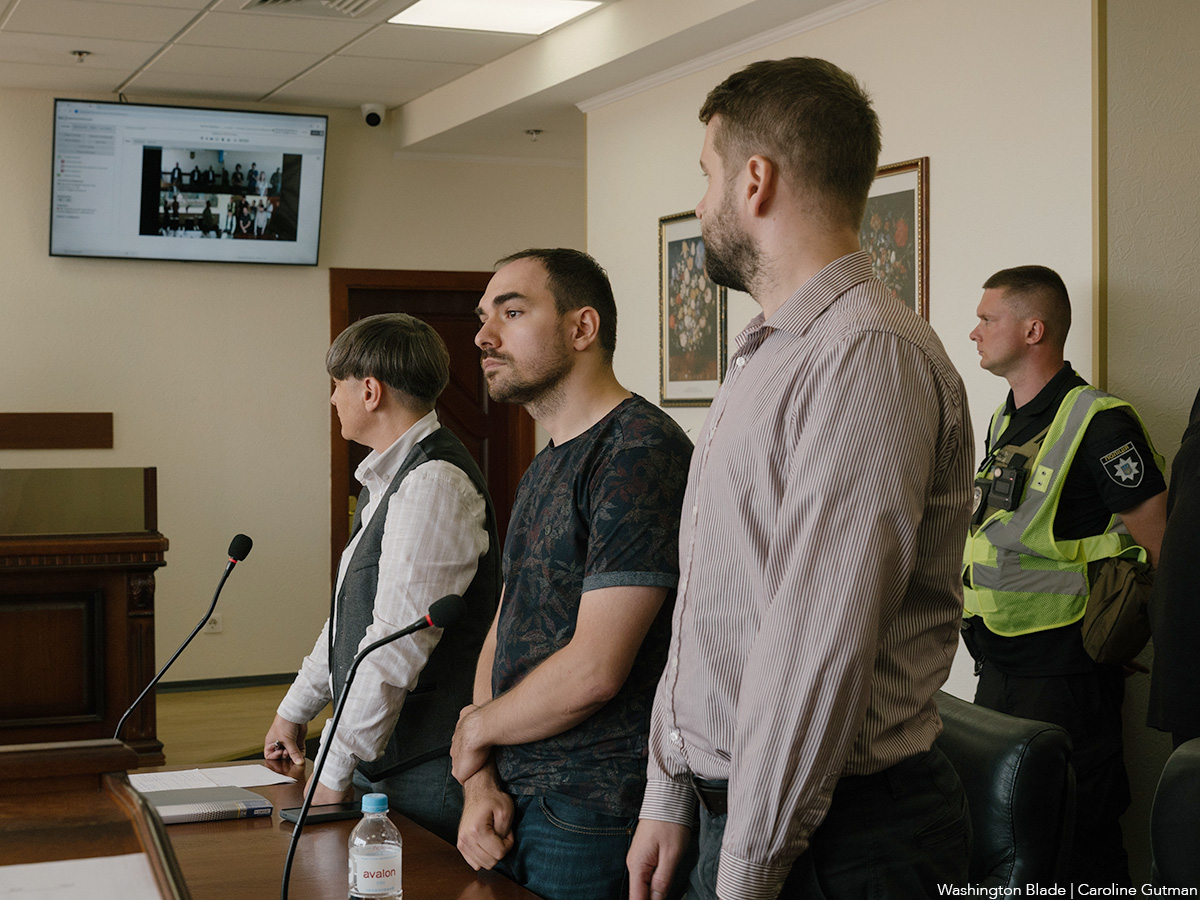
(Editor’s note: The International Women’s Media Foundation’s Women on the Ground: Reporting from Ukraine’s Unseen Frontlines Initiative in partnership with the Howard G. Buffett Foundation funded this reporting.)
Thirty-one-year-old Timur Levchuk was hurrying downstairs, away from the stuffy courtroom, packed with reporters, members of far-right groups and LGBTQ activists. The court hearing sounded like a duel between ideologies. The word “family” was the target — his family. Levchuk’s opponents from the conservative group Vsi Razom or All Together, initiated the court hearing to dissolve his marriage. He was trying to hold back his emotions.
The war has been breathing death, ruining lives across his country for nearly four years. At any moment, a missile or drone could hit his home. Under martial law, the border was closed for men of Levchuk’s age. He had not been able to move together with his partner, a Ukrainian diplomat, Zoryan Kis, who is posted on a mission abroad. Almost every night, he awakes to air alerts, to Russia’s attacks. And now aggressive right-wing activists were attacking his marriage, his right to be happy, to have a future.
As soon as Levchuk stepped outside, he saw a crowd of his friends from the LGBTQ community cheering and jumping with joy, holding colorful banners in their hands: “Our family is real!” and “Family is above the stereotypes!” Overwhelmed with emotions, Levchuk broke into tears. His partner of 13 years, Kis, quickly walked up to him. They hugged, as their friends cheered the first legal gay marriage victory in Ukraine.
Levchuk’s face was wet, he was crying. The partners see one another just twice a year; but this fight for their official marriage went on and on, it meant a chance to live together.
“Zorian had to travel from Israel for this hearing today, for just one day, and half of our day was stolen from us by this conservative group, which acts just like Russian homophobes,” Kis told the Blade.
Tears continued to run down his face.
“We hear that our opponents from Vsi Razom, the group fighting the court decision recognizing our marriage, is supported by the U.S. fundamental Christian groups. This is shocking. We are attacked on the money from what used to be the world’s best democracy,” Levchuk told the Blade.
A group of right-wing supporters waited by the entrance to the court, too, with a few policemen in between, watching out for any signs of violence, in a country with enough of it already.
“This decision, this process of legalizing my marriage took me so much time, so much effort,” Levchuk continued. “I knew it would be painful. Our opponents, Vsi Razom activists and their leader, Ruslan Kukharchuk, claim they feel offended by the court decision. But it is our feelings and our rights that are being hurt.”
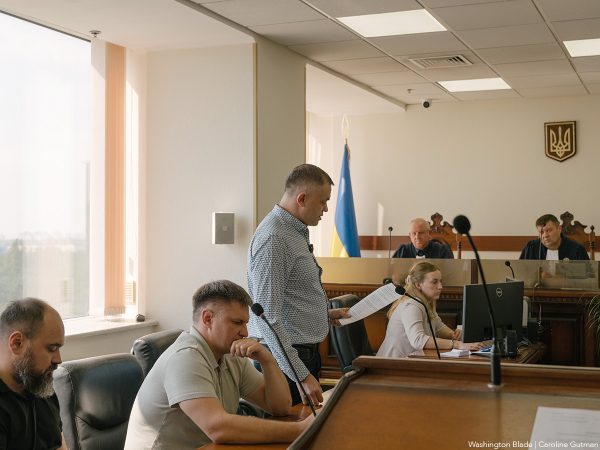
The appealing side, a middle-aged man, Kukharchuk, has been fighting against LGBTQ for more than 20 years. On Sept. 21, 2003, Kukharchuk and his group, called Love is Against Homosexuals, protested on Kyiv’s central square of Maidan with banners that said “Homosexualism is the enemy of family!” “Single sex love does not exist!”, and “You cannot be born gay, you can become gay.” Kukharchuk has been leading dozens of protests against LGBTQ rights. The Ukrainian Parliament voted for a new law criminalizing any reference to homosexuality in the media or public domain in 2012.
Before the Revolution of Dignity in 2014, the absolute majority of Ukrainians, up to 95 percent, did not support the idea of same-sex marriages, according to a social study conducted by GfK Ukraine, a social and market research group. But the revolution, the war in the east and the Russian invasion of Ukraine has dramatically changed the public view on the rights of minorities. Last year, more than 70 percent of Ukrainians said that LGBTQ people should have the same rights as everybody else, according to a survey by the International Institute of Sociology in Kyiv.
But Kukharchuk has not given up.
A fluent English speaker, he talks as if addressing President Donald Trump, encouraging America, too, to rise against LGBTQ rights.
“The U.S. government should not repeat the same mistake: not having the right actions behind the right beliefs,” he says on the Evangelical Focus, an outlet that describes its mission as “helping build bridges between evangelical churches and all of society.” He continues to trumpet his cause: “Ukraine unlike many European countries is the country where LGBT flags are still not flown on government buildings, where people are not fined for praying.”
Levchuk and Kis are not against Christian believers. They believe in Ukraine’s tolerance and respect for the rights of minorities. It’s been a thorny and long path for the two longtime LGBTQ activists. To test their hometown of Kyiv for homophobia, the two in 2015 on a summer day strolled around the city center, holding each other’s hands. Their friends were filming public reaction to the gay couple’s open walk. It seemed peaceful, at first. Pedestrians stared but did not insult the couple until the two sat down on a bench on the central street of Khreshchatyk. Three men attacked them, kicking Levchuk and Kiss, and spraying them with tear gas. The video of the violent attack went viral.
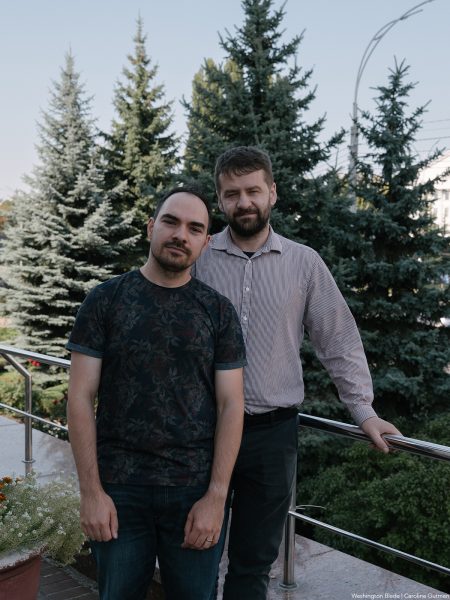
Levchuk and Kis waited for Ukraine to grow more tolerant for years. Kyiv rejected their marriage in 2021, “due to the fact that according to the legislation of Ukraine, the concept of marriage is defined as a family union of a woman and a man.” Last year, Kis was appointed to work in the Ukrainian embassy in Israel; and since all diplomatic families had a right to live together on diplomatic missions, he began to fight in court for his spouse’s right to travel abroad. Men are prohibited from traveling abroad under martial law rules intended to prevent draft dodging. Last year, Kyiv’s court decided to “refuse the proceedings.” But on July 10 this year, Kyiv’s district court recognized the fact of a “one-sex couple of spouses,” giving the couple a legal right to a marriage. That was a first in Ukraine’s history.
That decision was “unacceptable” to Kukharchuk and the Vsi Razom group; they appealed the court decision. When asked what brought him to the Kyiv Court of Appeal on Sept. 10, Kukharchuk said: “We absolutely believe that the Constitution is on our side. It very firmly underlines and emphasizes the definition of marriage — it can only be a union between one man and one woman, so our position in court is very clear.”
To the great joy of all Ukrainian LGBTQ couples, Kyiv’s appeal court confirmed the fact of the two men living in “a family” on Sept. 10. It recognized their marriage. But the victory felt bittersweet. The powers behind their opponents were in the United States, the spouses told the Blade.
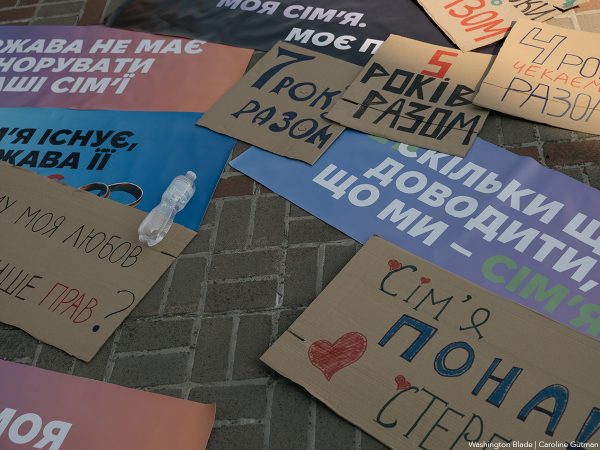
“We hear that our opponents from the conservative Vsi Razom group, receive financing from the Christian groups in the U.S.,” Levchuk told the Blade. “It’s hard to comprehend that our right to be happy is being questioned in the country of the best democracy in the world, the United States.”
But Kukharchuk lost the case, at least this time.
“We realize that our fight is not over. It’s hard and it takes forever. Our opponents will surely take the decision to the Supreme Court now,” Kis told the Blade.
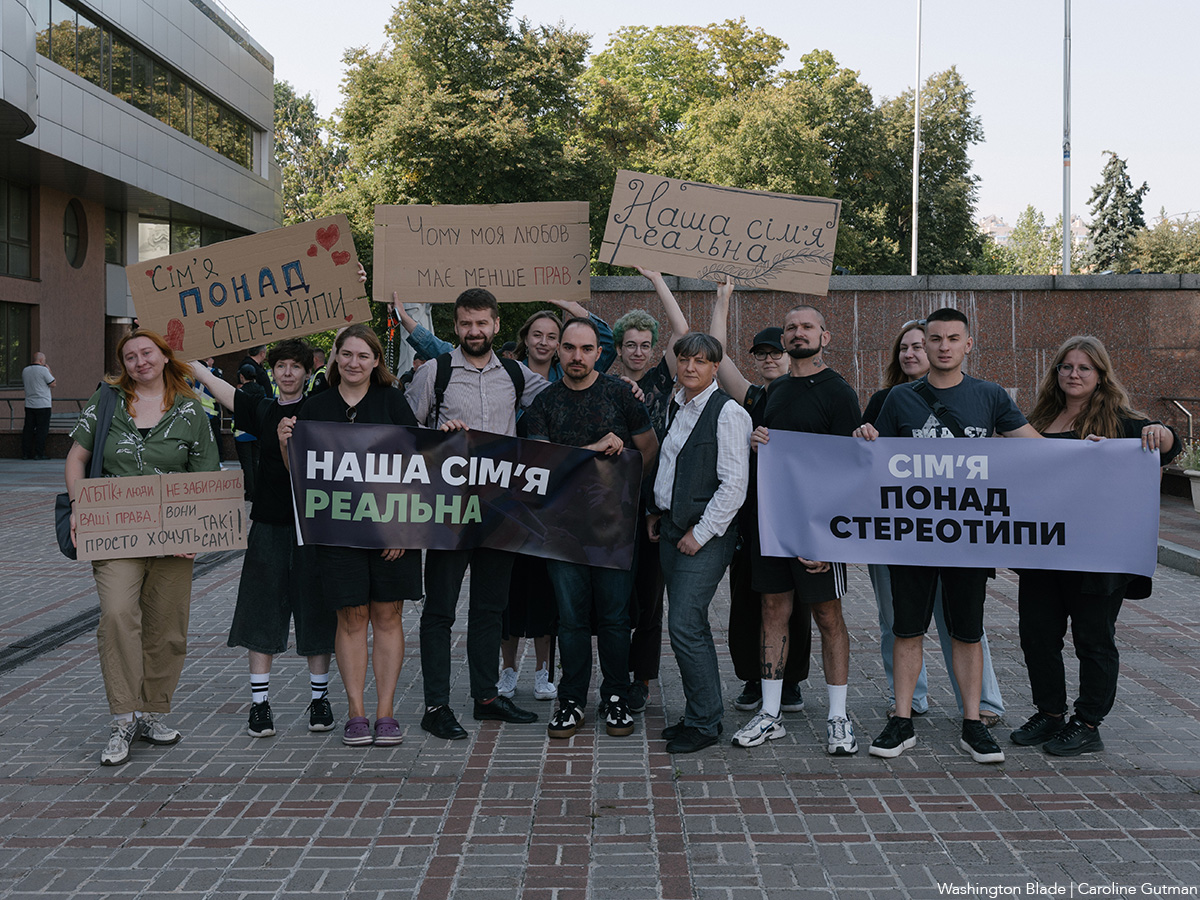
Ukraine
On the ground with Ukraine’s LGBTQ war heroes
Building a community amid attacks from inside and outside the country

(Editor’s note: The International Women’s Media Foundation’s Women on the Ground: Reporting from Ukraine’s Unseen Frontlines Initiative in partnership with the Howard G. Buffett Foundation funded this reporting. This report is exclusive to the Blade.)
Ukraine’s LGBTQ war heroes have a chance to build a community and share their courage.
Despite Russian drones raining down on the capital, Kyiv’s gay military and veteran community gathers in a freshly redecorated safe space called “K-41.” The club has been a boiling pot this summer — Ukrainian, German, Dutch, and Portuguese DJs played music on warm September nights, guests gathered to dance, listen to lectures, or see a movie in the leafy garden outside.
One of the recent lectures was on “Practices for Non-Discrimination for LGBTQ people in the Workplace.” For many community members, the workplace is now the front, where they continue to fight and defend their country from Russian troops attacking Ukraine’s eastern, northern, and southern regions. And on rejoining the community for a break, veterans take up a different fight, for their human rights, against discrimination. Their fight does not stop on the front lines.
The number of LGBTQ heroes is growing; so is the number of fallen, sadly. There is a wall at the center covered in soldiers’ patches.
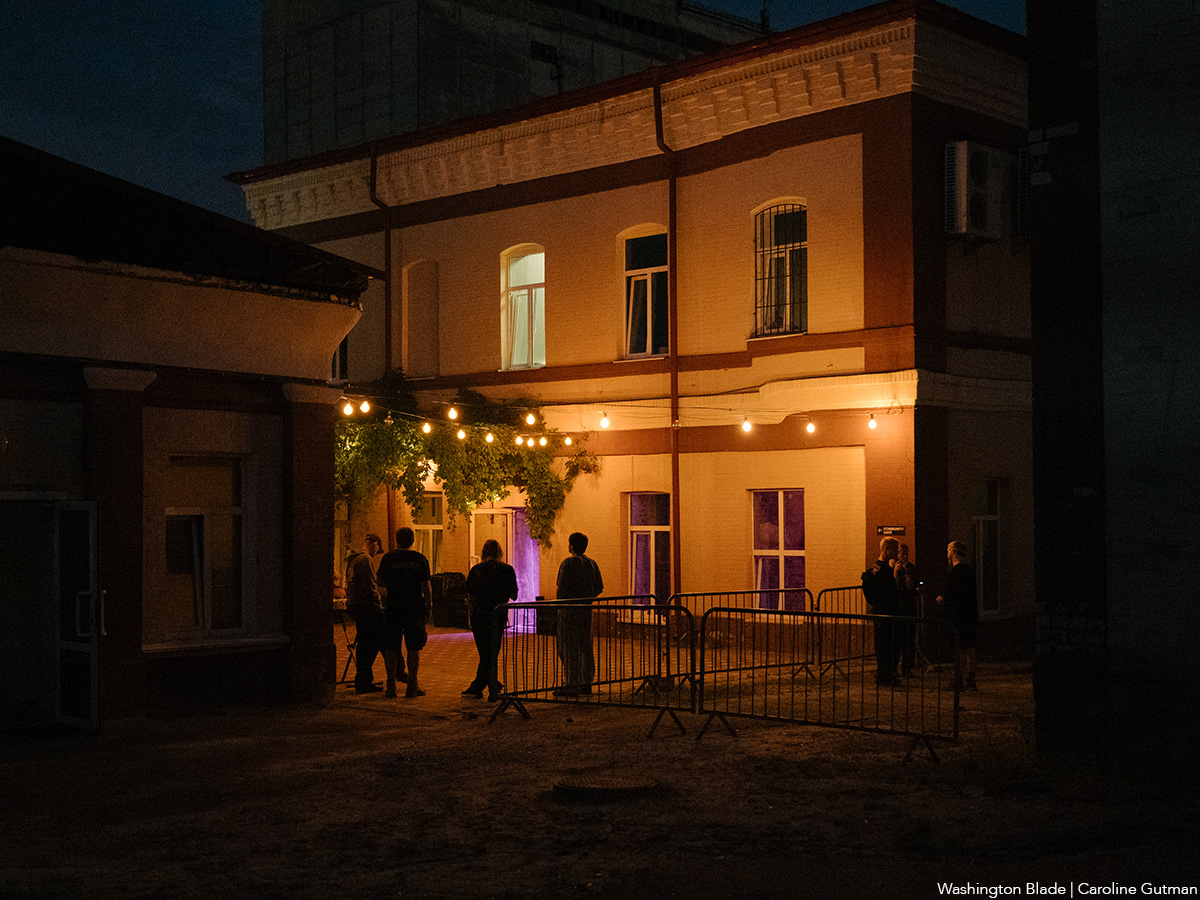
“Soldiers and veterans pop in and stick their insignias to this wall — we have welcomed more than 700 members into our LGBTQ veteran and military club,” one of the center’s founders, 38-year-old veteran, Victor Pylypenko, told the Blade with pride. Openly gay, he volunteered and fought for his country from 2014-2016 and then again from 2022-2024.
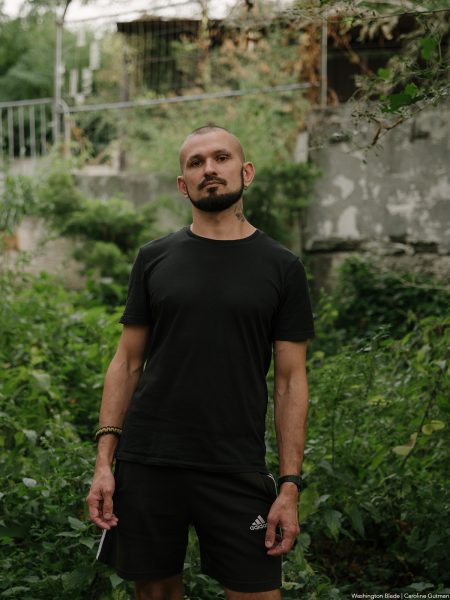
Giving us a tour of the club on a recent night, Pylypenko pointed out a portrait on the wall of another war hero, the newly elected leader of the “Ukrainian LGBT Military Personnel and Veterans for Equal Rights” NGO, Oleksandr Demenko. He is a survivor of the hellish battle for Mariupol and 20 months of horrific imprisonment in Russia.
“I always eat all the edges of the pizza, because I know that my brothers in arms do not have enough food or enough water in jail right now,” Demenko wrote, sharing his emotions recently with his Facebook readers.
A decorated officer, Demenko was among about 2,500 Ukrainian soldiers defending Azov Steel, a giant Soviet-era steel plant that was surrounded during the battle for the city of Mariupol from February to May, 2022.
Thanks to the British photographer Jesse Glazzard, who followed the lives of Ukrainian gay soldiers, Elton John helped Ukraine’s queer heroes.
“Elton John and his partner, David Furnish, bought a photograph by Glazzard in May and gave funds for our reconstruction of this center,” Pylypenko told the Blade. “We fixed the two rooms of the space nicely, bought furniture and the movie screen for our LGBTQ veterans — the biggest community for a military in Eastern Europe.”
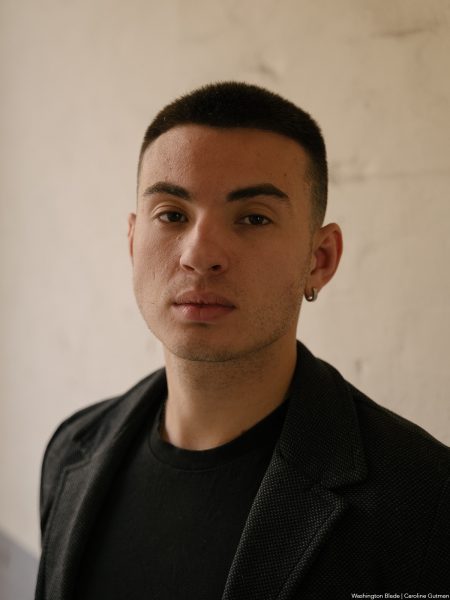
Demenko and his boyfriend recently became engaged, and the fight for the legalization of gay marriage became personal. Both Pylypenko and Demenko came to Kyiv’s Court of Appeals last month to support the first legal marriage.
“Every gay couple in our country hopes for President Zelensky to allow us to marry. This is our human right, along with every citizen,” the decorated veteran Demenko said in a recent interview.
To most members of this community, the war started in 2014 with Russia annexing the Crimean Peninsula. As many self-defense volunteers, Pylypenko, joined to defend his country in the Eastern regions of Ukraine. He served for nearly two years. There was too much homophobia at the time, so he stayed in the closet during his service. On coming home to Kyiv, Pylypenko tried to reconstruct his peaceful life, went to university and finished a master’s program in technical and scientific translation from English and French.
But the conflict with Russia did not stop; it escalated to Russia’s full-scale invasion early on the morning of Feb. 24, 2022. Pylypenko was visiting his parents in the town of Borodianka, a suburb north of Kyiv. Russian shelling blew up and burned buildings in Borodianka, killing hundreds of civilians.
Without thinking twice, Pylypenko volunteered to defend his country again, this time openly gay.
“At some point, I took out my cell phone with rainbow stickers from K-41 club; and my sergeant asked me if I was gay in front of everybody. I answered yes. The commander, who was only 22 years old, did not have any problems with that,” Pylypenko said.
During the battle for Kyiv, his platoon was defending the capital from the trenches on freezing cold days and nights, and saved lives of their wounded brothers in arms by evacuating them to hospitals. Pylypenko’s military experience was useful. And after Kyiv, he fought in the Sumy and Kharkiv regions. Some campaigns turned out “disastrous,” he said.
Last year, Pylypenko had to resign to take care of his father, who was “like a baby after a stroke.” The law allowed that. Shortly after his return from the front, the Ukrainian Orthodox Church honored him for “Courage and Love for Ukraine.”
“I thanked the church and Patriarch Filaret, previously famous for stating that gays had created COVID-19. I expressed my hopes that the priest would reject his homophobia; but immediately, the same day he cancelled his medal to me,” Pylypenko said. “Immediately, a flash mob began, soldiers who had previously received that same medal denounced it in solidarity with me. The soldiers’ brotherhood is great.”
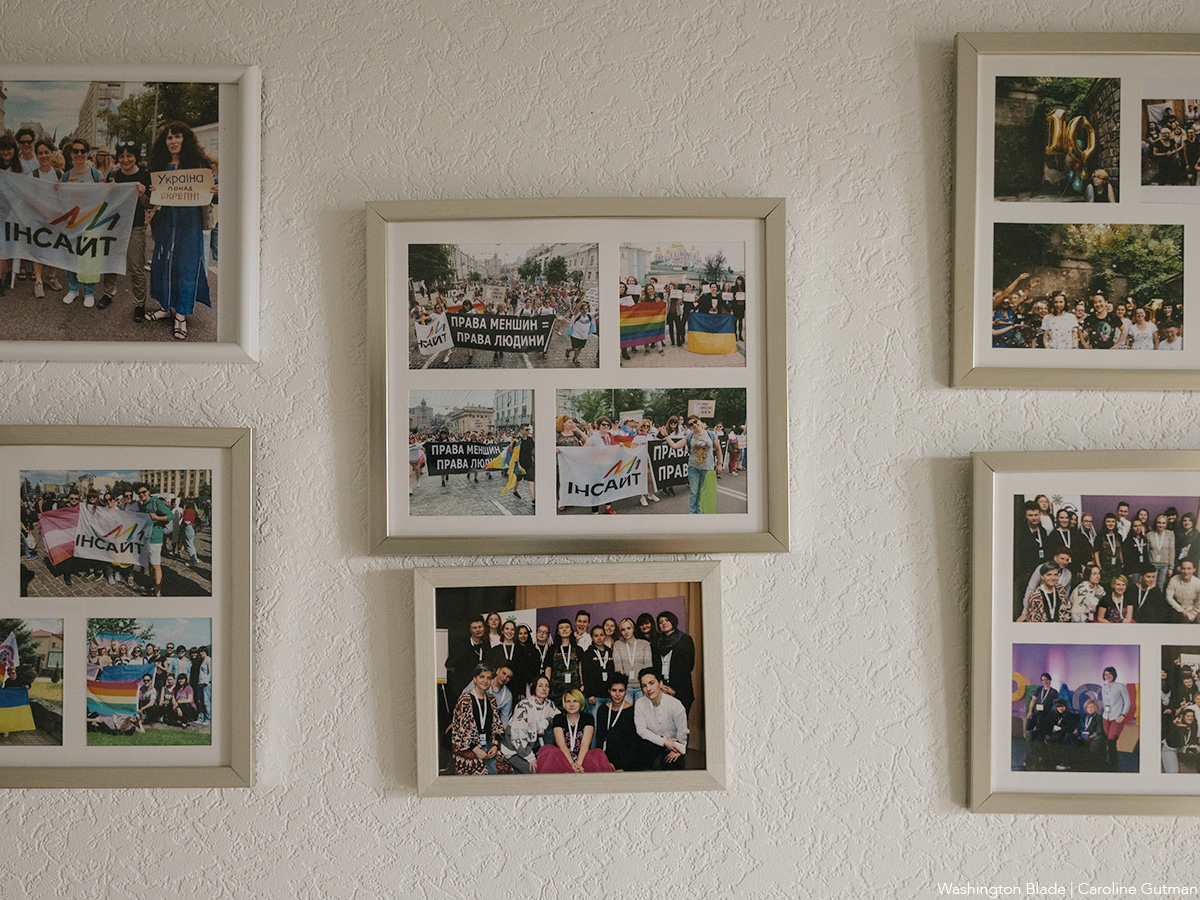
The battle for survival during the war is tiring. The battle for human rights in the war-torn country is exhausting. The LGBTQ community is vibrant, active and well-organized in Ukraine. Its activists across the country fight for human rights, judicial reform and against corruption together with prominent civil liberties groups. Olena Shevchenko, 42-year-old leader of Insight, a group focusing on LGBTQ and feminist activism, says there is no time to live: “I have no life. I have a constant fight.”
The Insight community center is a cozy house in the hipster part of Kyiv’s old town, Podil. For nearly four years, Insight activists have been providing aid, legal support and shelter for their community, organizing art exhibits and taking part in anti-corruption and pro-democracy campaigns.
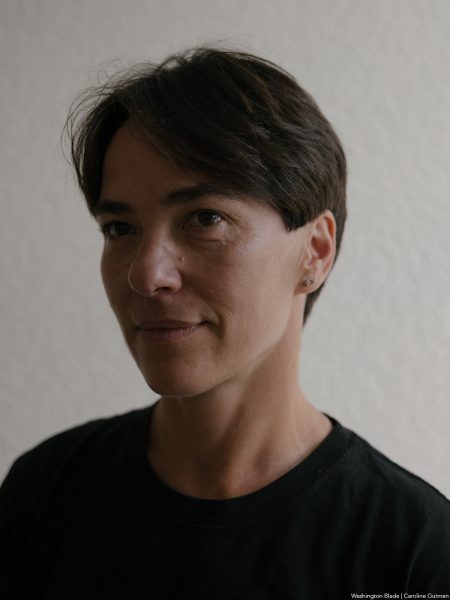
“Three days ago, homophobes attacked our center in Lviv and before that our center in Ivano-Frankivsk; some thugs stormed our exhibition in the city of Chernovtsy,” Shevchenko told the Blade. “They come again and again, break windows, spray walls with paint that imitates blood. Their goal is to block our events. They spray tear gas, terrify our activists.”
Shevchenko said that the attacks on the LGBTQ centers around the country are organized by far-right groups.
“One group is called Carpathian Sich, another Brotherhood, led by Dmytro Korchinsky and various new groups and networks frequently launched, like Tradition and Order,” she said. “We noticed that they received some amount of money about a year ago. They put around homophobic posters and aggressive stickers — we can tell that the money is coming to them. If before, money came from Russia, now they get funded from the U.S. as well.”
In spite of the attacks and risks, the community lives. Shevchenko, as many Ukrainians in the rear, saw her fight for human rights and against corruption as just as important as the fight on the frontline.
“If we don’t fight for democracy, who will do it? Our country would look bad if we stop. This is not just about LGBTQ, this is about freedom, democracy and the spirit that you can fight for something that is right,” she said. “Our government should be reminded about how good we are still at self-organization. We’ll be always here, this our own front. We have to keep track of democracy on all levels.”
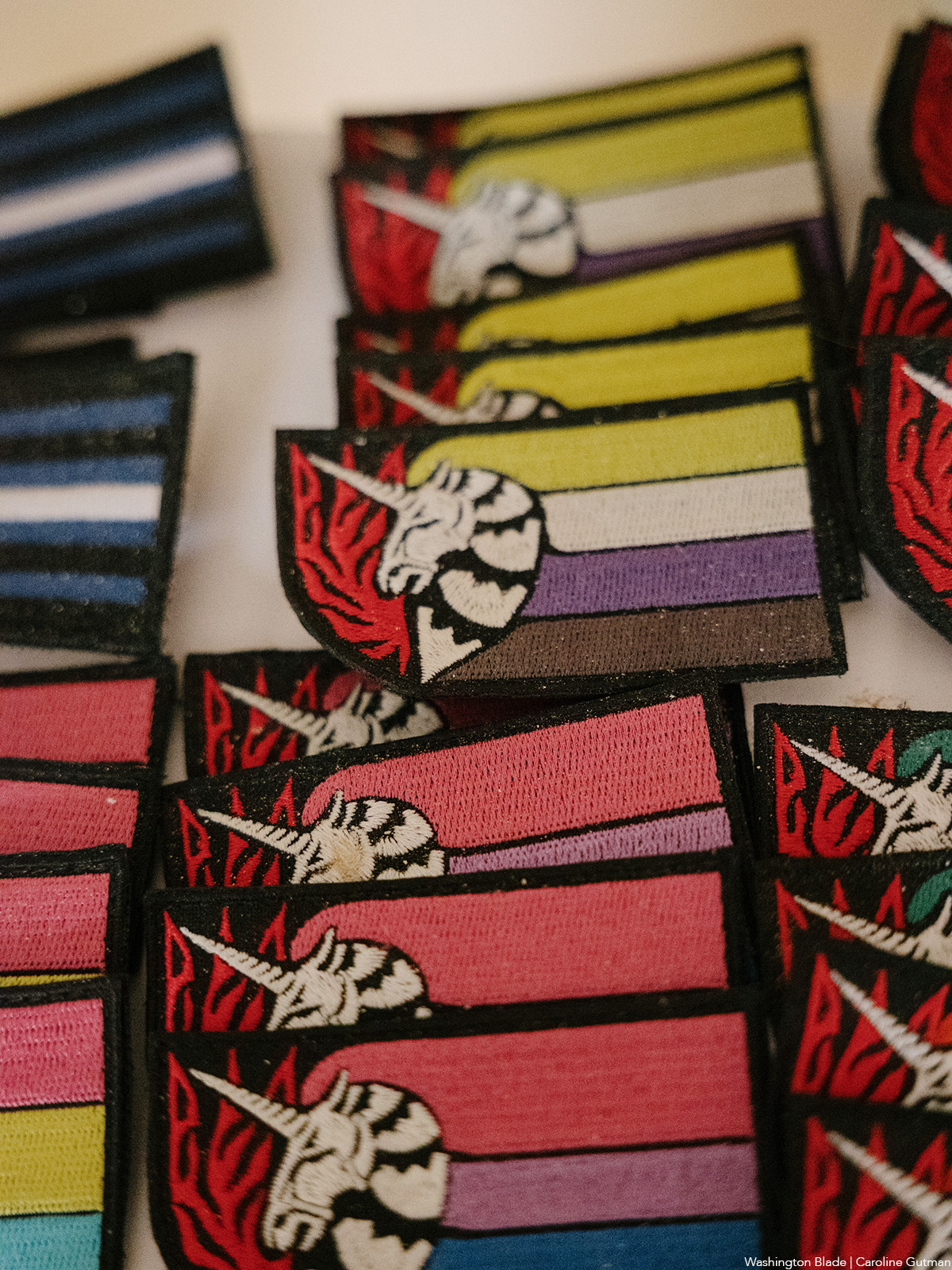
Celebrity News
Lesbian comedian who performed in Saudi Arabia apologizes
Jessica Kirson invited to participate in Riyadh Comedy Festival

A lesbian comedian who performed at a comedy festival in Saudi Arabia has apologized.
Jessica Kirson joined Dave Chappelle, Pete Davidson, and dozens of other comedians who participated in the Riyadh Comedy Festival that began in the Saudi capital on Sept. 26 and is scheduled to end on Thursday.
Kirson performed on Sept. 29.
Saudi Arabia is among the countries in which consensual same-sex sexual relations remain punishable by death.
A U.S. intelligence report concluded Saudi Crown Prince Mohammed bin Salman “likely approved” the murder of Jamal Khashoggi, a Washington Post columnist, inside the Saudi Consulate in Istanbul in 2018. The Saudi government has also faced criticism over the treatment of women, migrant workers, and other groups in the country.
“On Sept. 29, I performed at the Riyadh Comedy Festival. This decision has weighed heavily on my heart ever since,” said Kirson in an exclusive statement to The Hollywood Reporter. “I like to express my sincere regret for having performed under a government that continues to violate fundamental human rights.”
She said she was “surprised” as “an openly gay person” to receive an invitation to perform at the comedy festival.
“I requested a guarantee that I could be openly out as a lesbian on stage and perform gay material. I hoped that this could help LGBTQ+ people in Saudi Arabia feel seen and valued,” said Kirson. “I am grateful that I was able to do precisely that — to my knowledge, I am the first openly gay comic to talk about it on stage in Saudi Arabia. I received messages from attendees sharing how much it meant to them to participate in a gay-affirming event. At the same time, I deeply regret participating under the auspices of the Saudi government.”
Kirson in her statement to THR said she “donated the entirety of what I was paid to perform there to a human rights organization.”
She did not say how much the comedy festivals paid her, or the group to which she donated her fee.
“I made this decision because I want that money to go to an organization that can help combat these severe issues,” said Kirson.
THR notes Marc Maron, David Cross, and Atsuko Okatsuka are among the comedians who criticized the festival. Kirson in her statement said she respects her “fellow comics who have spoken out against” it.
“I recognize the concerns and criticism this has raised. I hope that this moment sparks dialogue about how we can use our platforms for good — to support people without a voice and to find ways to be less divided,” she said. “In the past, I’ve faced criticism for choices I’ve made, both on and off stage, and I rarely responded. This time, I felt I needed to speak up. I could not remain silent.”
Kirson ended her statement with an apology to her fans and others she has “hurt or disappointed.”
“I have a special relationship with my fans because of the vulnerable nature of my comedy and the trust they place in me as part of the queer community,” she said. “To my fans: I see you. I hear you. Your voice matters to me. I love you all, and I am genuinely sorry for making a poor decision that had repercussions I didn’t fully consider. I will take full responsibility for my actions and dedicate myself to making amends, so that my words and choices reflect the respect and care you deserve.”
The 2034 World Cup will take place in Saudi Arabia.
Qatar, which borders Saudi Arabia, hosted the 2022 World Cup. Consensual same-sex sexual relations remain punishable by death in the Middle East country.
President Donald Trump in May visited Qatar, Saudi Arabia, and the United Arab Emirates.
Colombia
Luto en Antioquia y Colombia: asesinan a la activista trans y politóloga Victoria Strauss
Su ausencia deja un vacío enorme

La comunidad LGBTQ+ en Colombia está de luto tras conocerse el fallecimiento de Victoria Strauss, reconocida politóloga egresada de la Universidad de Antioquia, activista trans y defensora de los derechos humanos, quien además se desempeñaba como docente universitaria.
Victoria fue hallada sin vida este lunes en Santa Elena, Antioquia, después de haber sido reportada como desaparecida el 29 de septiembre. La noticia ha generado una profunda conmoción entre sus colegas, amistades y los movimientos sociales que la conocieron por su compromiso incansable en la defensa de la diversidad y la igualdad.
Un legado que no morirá
El trabajo de Strauss se consolidó como un pilar del activismo trans en Antioquia, inspirando a nuevas generaciones de liderazgos y abriendo caminos en la academia y en los espacios de participación social y política. Su ausencia deja un vacío enorme, pero también un legado que seguirá marcando la lucha por los derechos de la población LGBTQ+.
Desde OrgulloLGBT.co expresamos nuestra solidaridad con su familia, amistades y con todos los sectores de la sociedad que hoy sienten su partida. Exigimos a las autoridades que se investiguen de manera urgente las circunstancias de su muerte y que se esclarezca si existieron negligencias en la atención y búsqueda.
Hoy despedimos a una gran lideresa trans, cuya voz no se apagará y cuyo legado seguirá vivo en cada lucha por la igualdad.
Mongolia
UN urges Mongolia to do more to protect LGBTQ+ rights
Discrimination, lack of legal recognition undermine progress
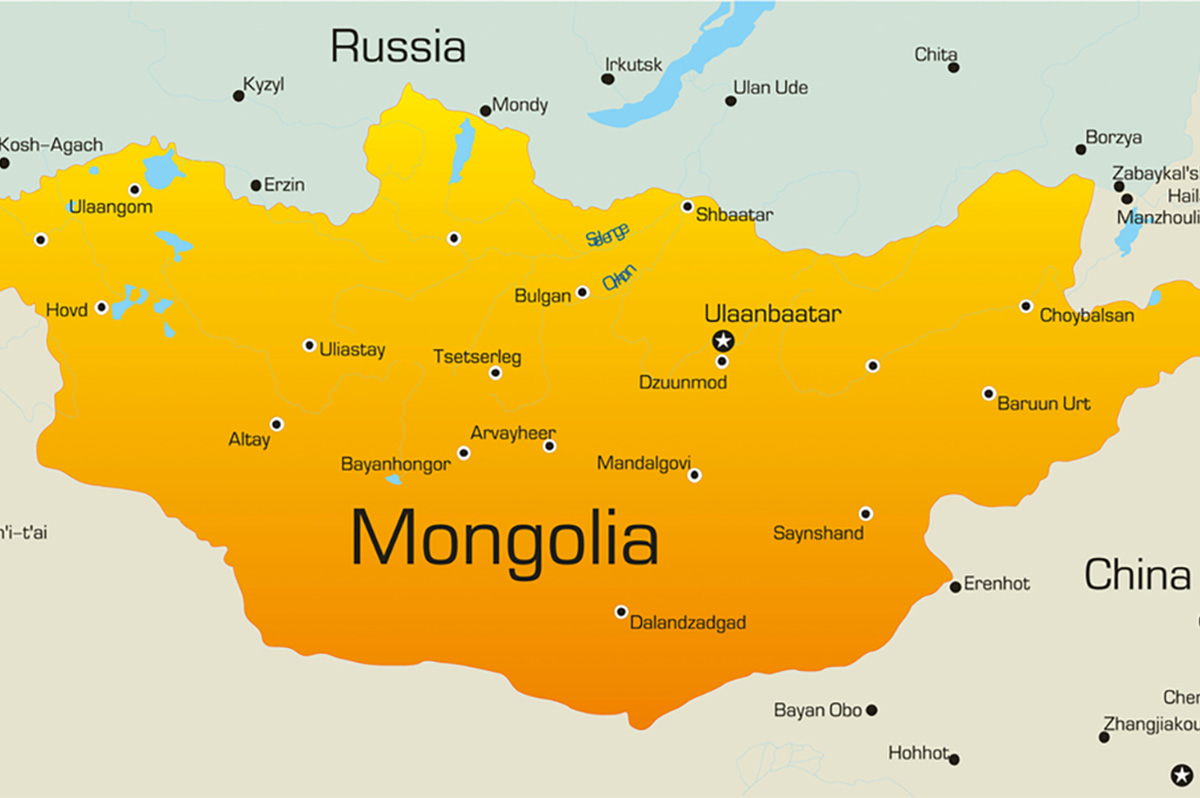
The U.N. earlier this year urged Mongolia to bolster protections for LGBTQ+ and intersex people, warning that entrenched discrimination and gaps in legal recognition continue to undermine recent progress.
In its Concluding Observations on the Fifth Periodic Report of Mongolia, the U.N. Human Rights Committee cited unreported attacks, bias in law enforcement, and the absence of rights for same-sex couples as barriers to equality in the country.
Mongolia has made measurable strides toward LGBTQ+ inclusion: decriminalizing consensual same-sex sexual relations, and outlawing discrimination based on sexual orientation and gender identity in its labor and criminal codes. Hate crime provisions allow for tougher penalties, and transgender people can amend legal documents to reflect their gender, though only after medical intervention. Mongolian law, however, stops short of recognizing same-sex marriages or civil unions, offers no status for nonbinary people, and provides limited protection for queer parents, leaving much of the community without full legal equality.
The Human Rights Committee also faulted Mongolia for the weak enforcement of its broader anti-discrimination framework, noting that few complaints reach the courts and prosecutions remain rare — a gap that limits remedies for LGBTQ+ people, despite legal protections on paper. The committee urged the government to widen the definition of discrimination, ease the burden of proof for victims, and raise public awareness about how to seek redress, alongside strengthening the reach and diversity of its National Human Rights Commission.
The U.N. Human Rights Committee has urged Mongolia to adopt sweeping anti-discrimination laws that protect people from bias in both public and private life, specifically including sexual orientation and gender identity. It also called for strong legal remedies and recommended that judges, prosecutors, and law enforcement officials receive proper training on discrimination, alongside broader efforts to raise public awareness about how victims can seek justice.
The report also called on Mongolia to intensify efforts to combat stereotypes and prejudice against LGBTQ+ and intersex people. It urged authorities to ensure that acts of discrimination and violence targeting them are thoroughly investigated, that perpetrators are prosecuted and, if convicted, receive appropriate penalties, and that victims are granted full reparations.
The committee further recommended guaranteeing freedom of peaceful assembly for LGBTQ+ and intersex people, including during the annual Equality Walk at Chinggis Square in Ulaanbaatar, the Mongolian capital, ensuring that any restrictions are applied fairly and in line with international standards. The report also highlighted the need for legislation that recognizes and protects same-sex couples.
The U.N. report also raised alarms over restrictions on peaceful assembly in Mongolia, citing accounts that authorities have curtailed demonstrations critical of the government as well as gatherings in support of LGBTQ+ and intersex rights. While acknowledging a draft revision of the 1994 law on demonstrations and assembly that would shift to a notification system, the committee warned a proposed requirement for police authorization to use main roads could undermine those reforms. It further expressed concern about reports of disproportionate force and arbitrary detentions during protests, and about a pending bill to amend the Criminal Code to impose prison sentences on those obstructing mining or other development projects, which could erode protections for the right to peaceful assembly.
Authorities on Dec. 4, 2024, arrested Naran Unurtsetseg, editor-in-chief of Zarig.mn, an independent news site, and held her for 68 days on charges that included contempt of court and spreading false information after she criticized judges and a prosecutor online. The arrest took place weeks after the General Judiciary Council urged an investigation into her remarks, and the site was briefly blocked ahead of her detention. The case has drawn sharp criticism from press freedom groups over the misuse of criminal defamation laws to stifle critical journalism in Mongolia.
Erdeneburen Dorjpurev, deputy director of the LGBT Center in Mongolia, told the Los Angeles Blade that in recent years her organization has handled several cases in which police officers themselves perpetrated prejudice, discrimination, abuse and harassment against LGBTQ+ people.
“These cases often make up around 30 percent of our referrals,” Dorjpurev noted.
She cited a 2022 incident in which officers allegedly forced their way into a gay couple’s home without a warrant, physically assaulted and verbally abused them, and mocked their sexual orientation. Dorjpurev said the officers also demanded access to the couple’s personal devices and, after obtaining it, circulated intimate videos among themselves and to others, deliberately humiliating the pair because of their identity.
“The survivor of this incident refrained from reporting this incident due to a fear of further harassment and abuse from the police,” Dorjpurev told the Blade. “The police officers in this incident, deliberately treated the couple with hostility, using derogatory terms in referring to their sexual and gender orientation. The police abused the position and power to humiliate the survivors by treating them inhumanely due to their own prejudice and discrimination against the LGBTQI+ community.”
Dorjpurev said the U.N. Human Rights Committee report underscored persistent mistreatment of LGBTQ+ people in Mongolia by police and healthcare providers. She noted incidents of discrimination and inhumane treatment “are still not being taken seriously and are often refused as official complaints,” leaving victims with little recourse. Dorjpurev added her organization urged authorities to expand scrutiny of human rights conditions for LGBTQ+ people in detention facilities, prisons, military bases, and other closed institutions, stressing the need to ensure those spaces are safe for sexual and gender minorities.
“While the Criminal Code includes provisions that sanction discrimination based on sexual orientation and gender identity, we still lack the proper tools to protect and support individuals. Even today, we still struggle in safe reporting, file complaints against any discriminatory acts,” Dorjpurev told the Blade. “This is due to the fact that individuals are still refused service from state services, still treated unfairly as well as still face harassment and discrimination from service providers. There is still a culture where an individual’s private information is disclosed without their consent, especially around their sexual orientation and gender identity. Further, service providers additionally utilize derogatory terms to shame and embarrass individuals, as well as repeatedly ask unnecessary, provoking questions around their gender and sexual orientation and identity.”
Dorjpurev further noted that, given this climate, most LGBTQ+ people in Mongolia are reluctant to seek help from state agencies or even private service providers, fearing further mistreatment or denial of their basic rights. Legal assistance is also scarce, she said, as few lawyers or other professionals focus on human rights and anti-discrimination cases.
Dorjpurev recalled a lawyer who collaborated with the LGBT Center on a case in 2019 faced harassment and discrimination simply for representing an LGBTQ+ client.
Dorjpurev highlighted that, to date, there has not been a single successfully resolved case of discrimination under Article 14.1 of the Criminal Code.
The LGBT Center in 2019 filed a complaint against a high-ranking state official who abused his authority to remove the organization’s posters from buses during Equality and Pride Days and posted anti-LGBTQ+ content on social media. Dorjpurev noted prosecutors at multiple levels rejected the case, despite many complaints.
“In Mongolia, despite not following ‘Western’ conversion therapy, we have our traditional Shamanic religion as well as Buddhism which still heavily influences our society,” she said.
“We have been referred to cases where community members have been subject to religious conversion — this mostly impacts those under the age of 18 where their parent or guardian believes they are suffering from a mental illness or other forms of health issue therefore forces them into meeting religious figures and shamans.” added Dorjpurev. “This is because the parent or the guardian often believe that they would be able to ‘pray away’ or ‘wash away’ their queer identity. These kinds of practices are often repeated on a daily basis having a severe impact on the mental wellbeing of their children; in some incidents these children are forced into having sexual intercourse with the opposite sex in order to ‘make them straight.’”
The LGBT Center in 2021 worked on the case of an gay 18-year-old who was told he would be burned with a hot stone and whipped if he did not become straight and gender conforming. Dorjpurev noted this man “was also referred to be sent to a psychiatrist where he was administered various different psyche-altering medications.”
Dorjpurev emphasized a key step for the Mongolian government is to demonstrate genuine commitment to LGBTQ+ and intersex rights and to transparently engage with civil society organizations. She noted that while various policies and laws have been introduced in the name of protecting LGBTQ+ and intersex people, these measures have largely excluded direct input from human rights defenders, limiting their effectiveness and accountability. Dorjpurev added these policies would have a stronger impact if developed in genuine consultation with civil society, ensuring concrete human rights provisions.
The LGBT Center, the National Human Rights Commission, and the Ulaanbaatar mayor’s office in 2024 co-organized a roundtable to discuss LGBTQ+ and intersex rights. Dorjpurev said this collaboration made the 2024 and 2025 Equality Marches possible.
She told the Blade that such examples demonstrate the benefits of consistent engagement with NGOs to build meaningful civic space and translate Mongolia’s commitment to equality into practice.
Dorjpurev called on international organizations, particularly the U.N., to continue supporting activists through in-person advocacy, technical assistance, and by improving both physical and language accessibility. She urged the U.N. to strengthen its role in monitoring the implementation of treaty body recommendations, working closely with the Resident Coordinator’s Office, and ensuring in-country teams engage directly with NGOs. Dorjpurev stressed that national-level dialogue must be inclusive, bringing together government agencies, civil society organizations, the U.N. Development Program, UNICEF, and other relevant U.N. bodies to guarantee meaningful participation and accountability.
“International NGOs also have a critical role to play,” said Dorjpurev, who specifically praised ILGA World, ILGA Asia, COC Nederland from the Netherlands, and other NGOs. “But more INGOs need to step up to support local civil society organizations in engaging with UN mechanisms.”
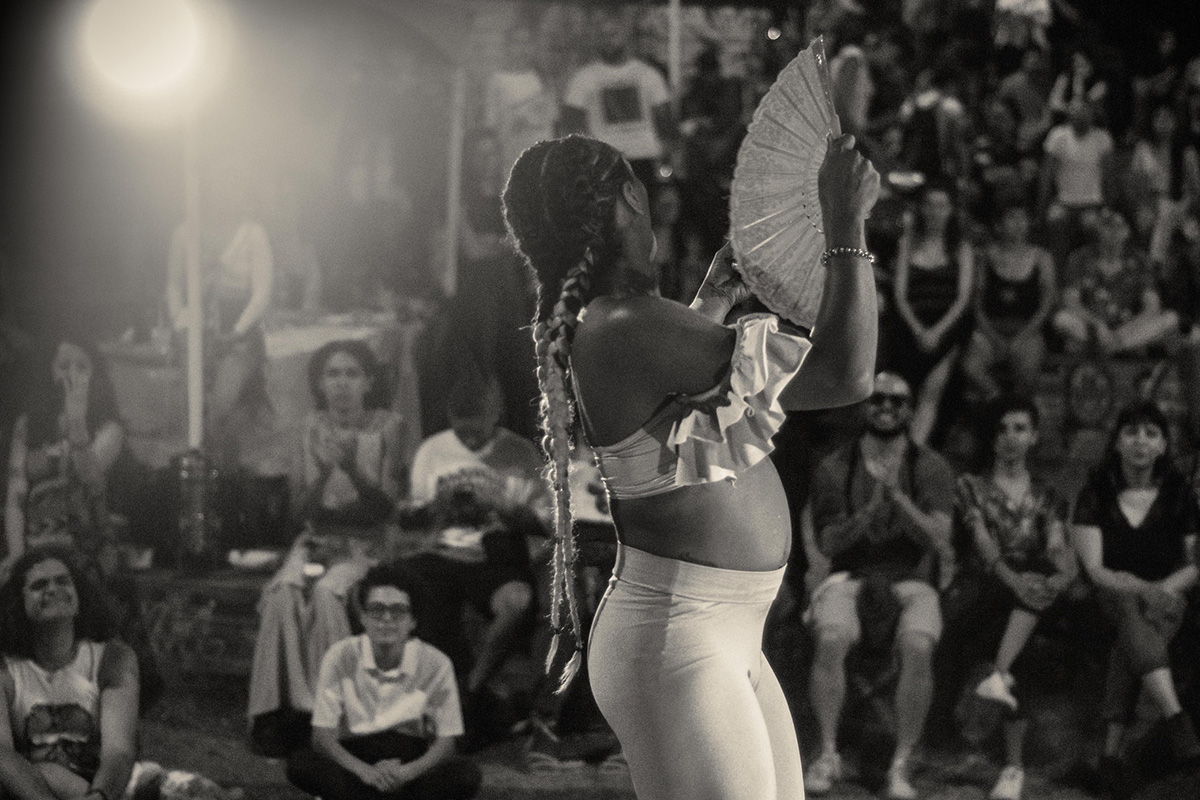
En el corazón de Medellín hay una red que late con fuerza propia. No aparece en los grandes titulares, pero su presencia se percibe en el sonido de un tambor que marca el ritmo de un ensayo, en las manos que se manchan de colores para pintar un mural, en el aire tibio que entra por las ventanas abiertas y se mezcla con el eco de una risa, en los abrazos que cierran una jornada. Es la Red Popular Trans, una plataforma comunitaria que ha hecho del arte, la naturaleza, las espiritualidades y la organización social una herramienta de vida para cientos de personas trans, no binaries y cuir, un lugar donde la creatividad fluye como el agua, se expande como el viento y se enraíza como un árbol que crece en suelo fértil.
Allí, los sueños se tejen en colectivo y las puertas que antes parecían cerradas se abren para dejar pasar la luz. De ese trabajo nació el Festival Interdisciplinar de Artes Trans – Travar las Artes, organizado junto a la colectiva Pajarapintadanza y fundado con el impulso y liderazgo de Ale Álvarez, quien fue una de sus creadoras y principal representante durante los primeros cuatro años. Este festival no es un evento para la foto, es el primer festival de arte trans en Colombia dirigido por personas trans y para personas trans, un hecho histórico que ha marcado un antes y un después en la cultura del país.
No es un simple espacio de exhibición: es un laboratorio vivo de resistencia y cuidado donde la danza, el teatro, la música, la poesía y las artes visuales dialogan con la tierra, el cuerpo y la voz, devolviéndoles su poder y transformándolos en acto político y en celebración de la vida. Travar las Artes ha demostrado que la cultura también puede ser una trinchera de libertad, y que es posible resignificar tradiciones para abrir nuevos caminos. Basta recordar la reinterpretación del bullerengue, una danza tradicional colombiana, llevada a escena desde una mirada queer y desafiante. Poner a una travesti a bailar bullerengue no fue un simple acto estético, sino un gesto político que desafió estructuras hegemónicas y abrió posibilidades de representación que antes parecían impensables.
En este espacio no hay protagonistas únicos. Cada historia es un cauce que alimenta un mismo río: la joven que encontró en la danza un lenguaje para hablar de su identidad sin miedo, el actor que convirtió su transición en una obra de teatro que recorre barrios y escuelas, la cantante que lleva su voz a escenarios comunitarios porque sabe que allí también se construye país. Entre esas historias, una brilla con especial fuerza: la de Ale.
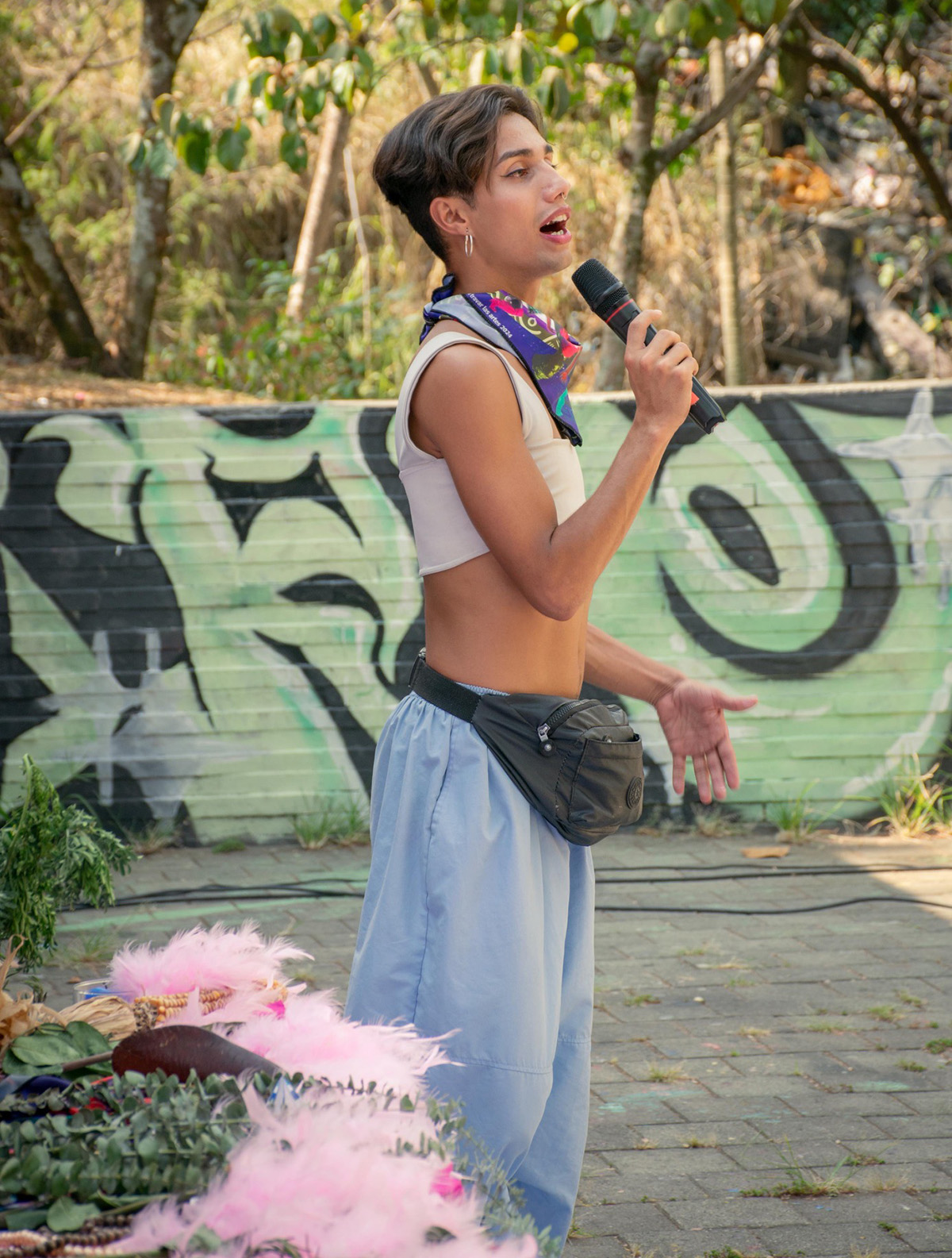
Ale llegó a la Red Popular Trans buscando un lugar seguro donde pudiera ser sin explicaciones ni condiciones. Lo encontró, y encontró también un espejo en el arte, una forma de reconocerse. Lo que empezó como curiosidad por la danza se volvió vocación y raíz. Hoy es licenciada en Danza, graduada con honores, y ha regresado a los mismos espacios que la vieron crecer para guiar a otres que, como ella, buscan un camino. En cada taller que facilita, Ale recuerda que antes de ser profesional fue una persona que necesitaba escuchar: “Aquí eres bienvenide”.
Esa frase resume la esencia de lo que aquí ocurre. La Red Popular Trans no solo impulsa el festival: organiza talleres permanentes, acompaña procesos de salud y bienestar, conecta artistas con oportunidades y teje redes de apoyo que se sostienen incluso fuera del escenario. Pajarapintadanza ha puesto el cuerpo, el movimiento y el espíritu al servicio de la pedagogía queer y decolonial, demostrando que el arte puede sanar, movilizar y transformar.
En estas redes, cada logro individual es una victoria colectiva. Cuando une bailarín trans pisa un escenario, cuando une pintore no binarie exhibe su obra, cuando une poeta cuir recita frente a su comunidad, toda la red respira con orgullo. El arte que nace aquí no es lujo, es necesidad; no solo inspira, sino que salva. Es viento que acaricia, raíz que sostiene, agua que fluye y fuego que enciende. El trabajo comunitario, constante y apasionado, convierte historias marcadas por el dolor en relatos de resiliencia y esperanza. Ale, la Red Popular Trans, Pajarapintadanza y Travar las Artes son prueba viva de ello, recordándonos que mientras haya cuerpos que bailen, voces que se alcen y manos que creen, siempre habrá un lugar para empezar de nuevo, y a veces, sin darnos cuenta, ese lugar se convierte en hogar.
Honduras
EPU: Honduras en deuda en violencia, niñez y diversidad sexual
Más de 70 organizaciones presentaron informes
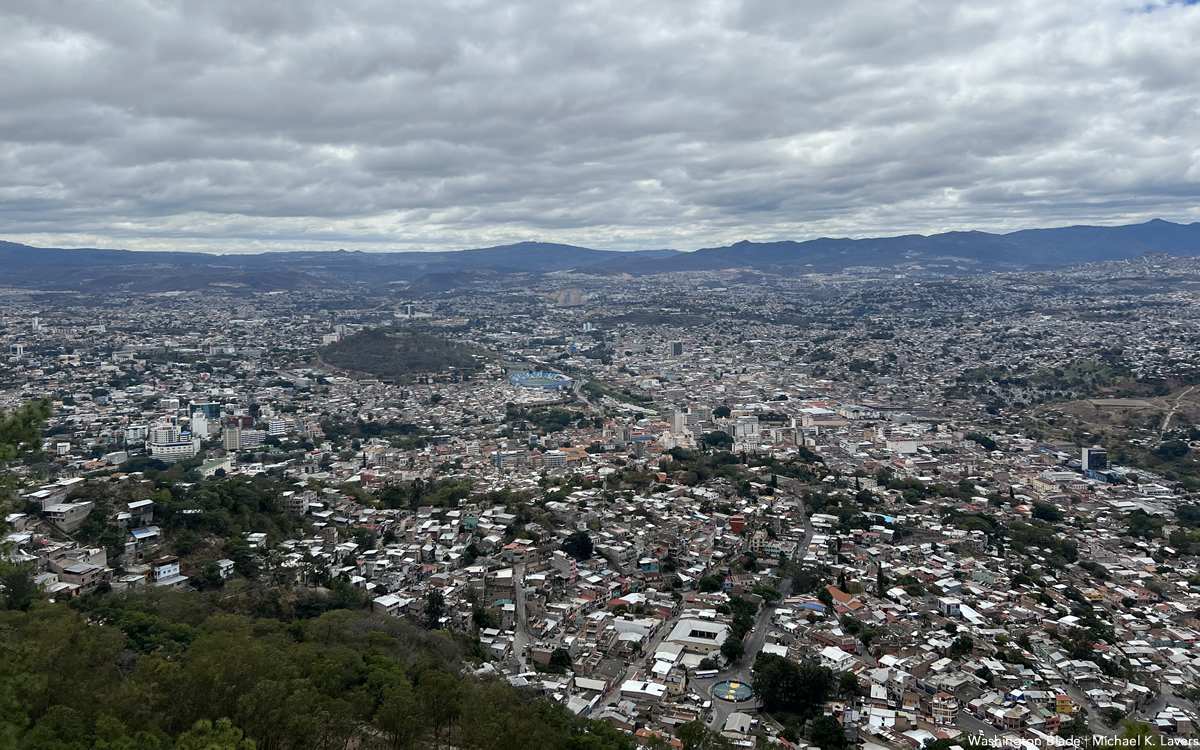
Por NAZARETH GÓMEZ | TEGUCIGALPA, Honduras — En el marco del Examen Periódico Universal (EPU), mecanismo del Consejo de Derechos Humanos de la ONU, organizaciones de sociedad civil en Honduras presentaron informes alternativos para evidenciar el incumplimiento de compromisos en materia de derechos humanos. Las recomendaciones al Estado serán revisadas en noviembre de 2025, cuando Honduras enfrente su evaluación internacional.
Durante el evento se compartieron siete informes temáticos sobre mujeres, niñez, diversidad sexual, personas defensoras, tierra, discapacidad y radios comunitarias. Las organizaciones exigen que las recomendaciones se traduzcan en acciones reales.
Violencia contra las mujeres y retrocesos legales
La Plataforma EPU Mujeres denunció que entre 2020 y 2024 se registraron más de 1,500 muertes violentas de mujeres y más de 8,600 evaluaciones médicas por violencia sexual. Solo hay tres juzgados especializados y 72 fiscales para más de 100 mil denuncias anuales.
También alertaron que no se ha aprobado la Ley Integral contra la Violencia hacia las Mujeres ni la Ley de Violencia Política. Ciudad Mujer opera solo en seis ciudades, dejando sin cobertura al 42.8 por ciento de las mujeres. “Seguimos exigiendo voluntad política para avanzar”, afirmaron.
Niñez: pobreza, violencia y abandono estatal
Organizaciones como Coiproden expusieron que el 66.8 por ciento de la niñez vive en pobreza y que siete de cada diez están en situación de pobreza multidimensional. Aunque se ha creado la Secretaría de Niñez y se aprobó una política nacional, aún no hay presupuesto suficiente ni liderazgo institucional claro.
Entre 2020 y 2024, más de 270 niñas, niños y adolescentes murieron por violencia. También se reportaron más de 800,000 alertas de desaparición, de las cuales el 30 por ciento corresponde a niñez. Las organizaciones exigen actualizar la política de prevención de violencia y fortalecer el sistema de protección.
Diversidad sexual: impunidad y exclusión
Desde 2009, más de 400 personas LGBTQ+ han sido asesinadas en Honduras, con un 93 por ciento de impunidad. Las organizaciones denunciaron la falta de avance en la aprobación de la Ley de Identidad de Género, el reconocimiento legal del matrimonio igualitario y la adopción de políticas inclusivas.
“El Estado mantiene patrones de discriminación institucional. No basta con crear políticas si no hay voluntad para implementarlas”, señalaron.
Solo existen seis fiscales a nivel nacional para investigar estos crímenes.
Territorio, pueblos indígenas y represión
El Centro de Estudios para la Democracia denunció que más de 1.8 millones de personas enfrentan inseguridad alimentaria grave. No se han hecho reformas para resolver la deuda agraria ni se han implementado sentencias a favor de comunidades garífunas.
También señalaron que, a pesar de existir un mecanismo de protección, Honduras sigue siendo uno de los países más peligrosos para las personas defensoras. “Se asesina, se criminaliza y no hay respuestas del Ministerio Público”, denunciaron.
Llamado urgente
Las organizaciones exigieron al Estado hondureño tomar con seriedad las recomendaciones del EPU.
Además, exigieron asumir compromisos reales con los sectores históricamente excluidos y garantizar el cumplimiento de los derechos humanos desde una visión integral y con enfoque de justicia.
Los informes completos están disponibles para consulta pública.
-

 Los Angeles4 days ago
Los Angeles4 days agoSouth L.A. celebrated Black joy and resistance at yesterday’s Martin Luther King Jr. Day Parade
-

 Los Angeles21 hours ago
Los Angeles21 hours agoUCLA’s long-standing LGBTQ+ alumni organization welcomes new president
-

 Features5 days ago
Features5 days agoLiliana T. Pérez-Palacios uplifts BIPOC, immigrant and queer rights with the L.A. Chargers
-

 LGBTQ+ Youth Mental Health2 days ago
LGBTQ+ Youth Mental Health2 days agoThe National Rainbow College Fund will grant $2,500 to 200 LGBTQ+ students: out or not
-

 Movies2 days ago
Movies2 days agoFew openly queer nominees land Oscar nominations as ‘Sinners’ and ‘One Battle After Another’ lead the pack
-

 Movies21 minutes ago
Movies21 minutes agoA ‘Battle’ we can’t avoid





